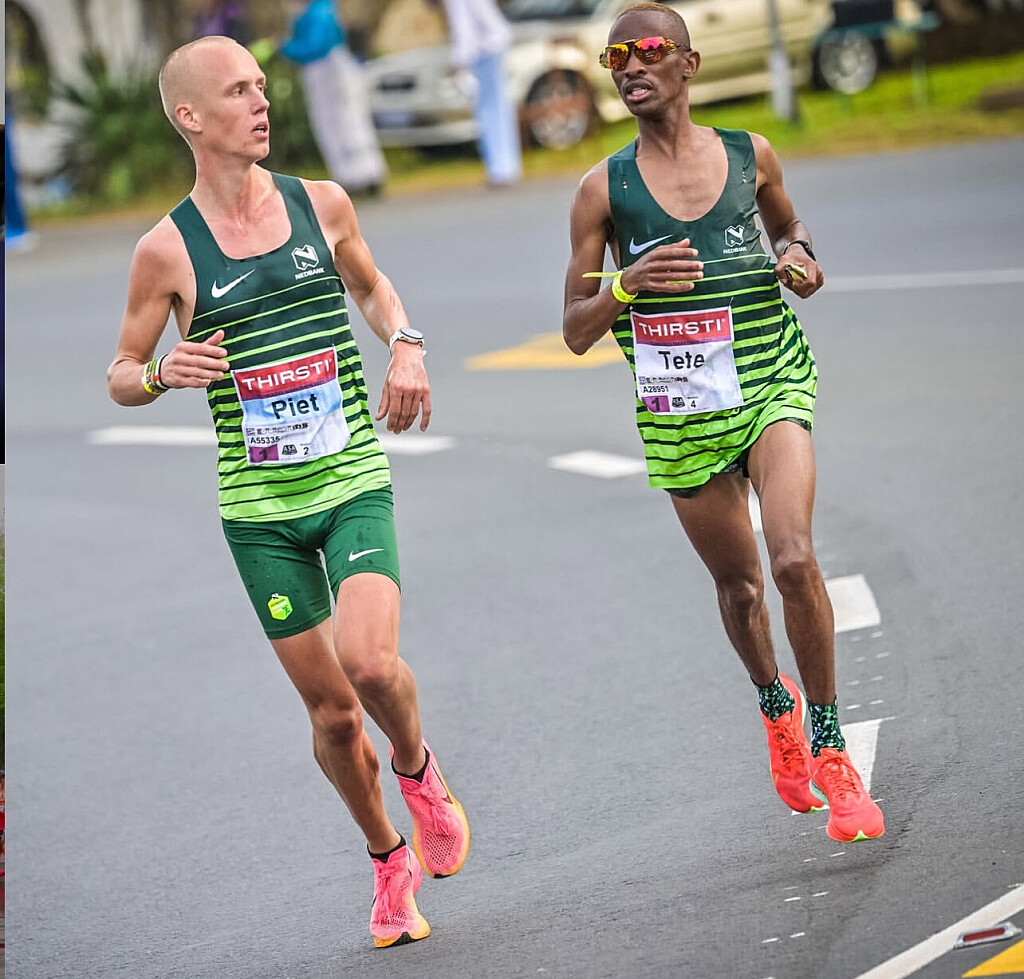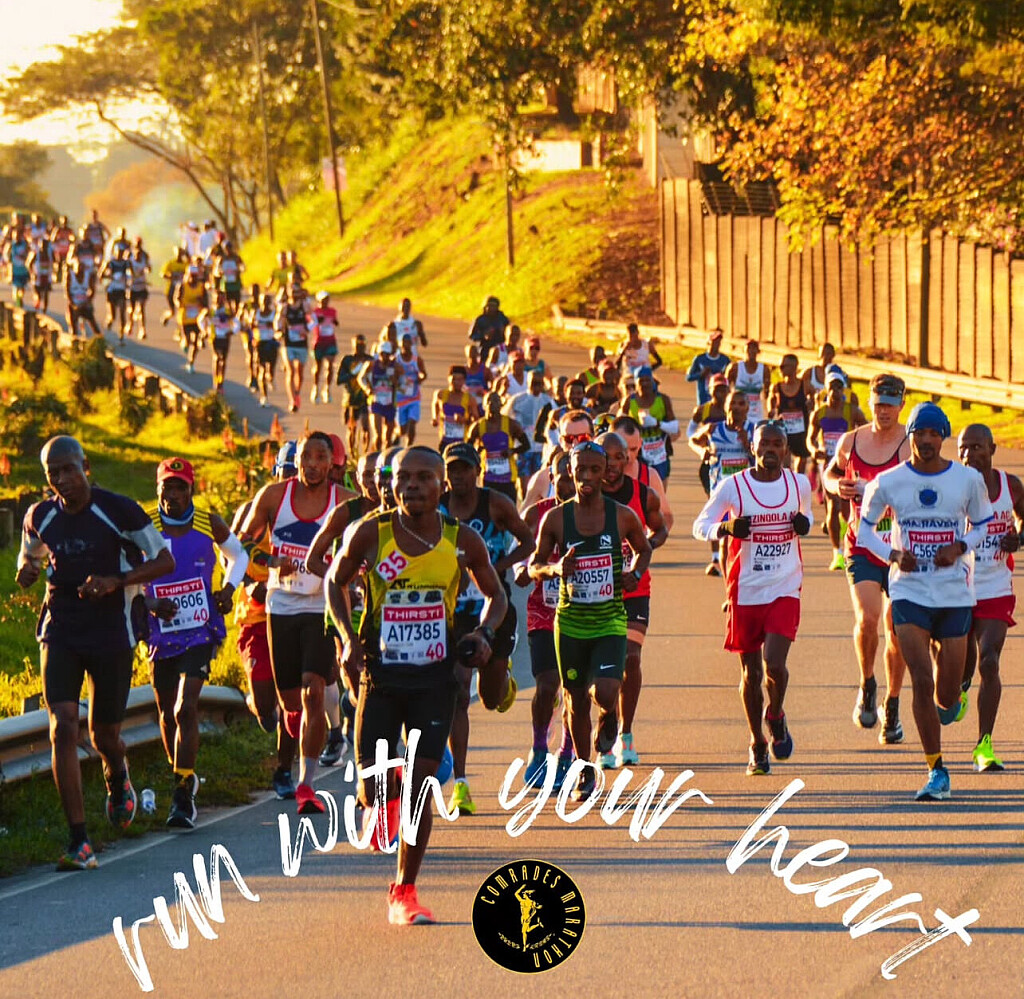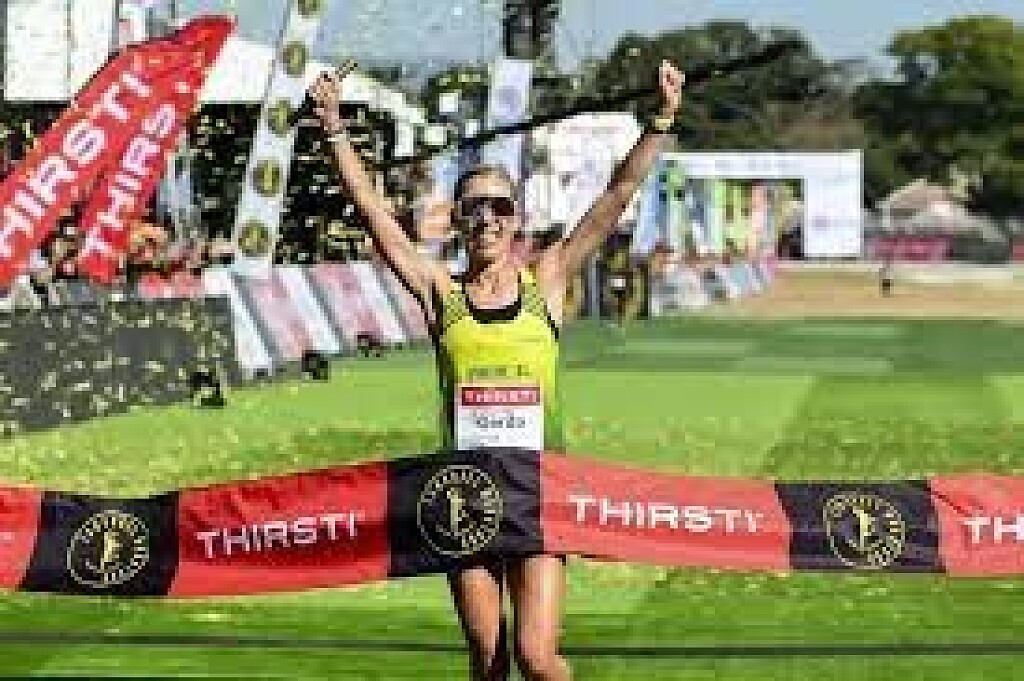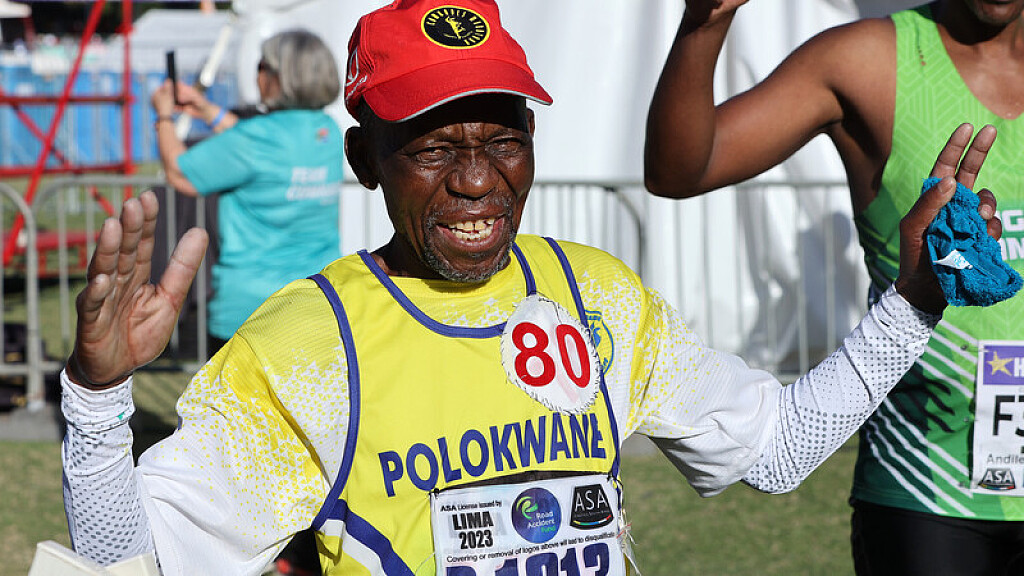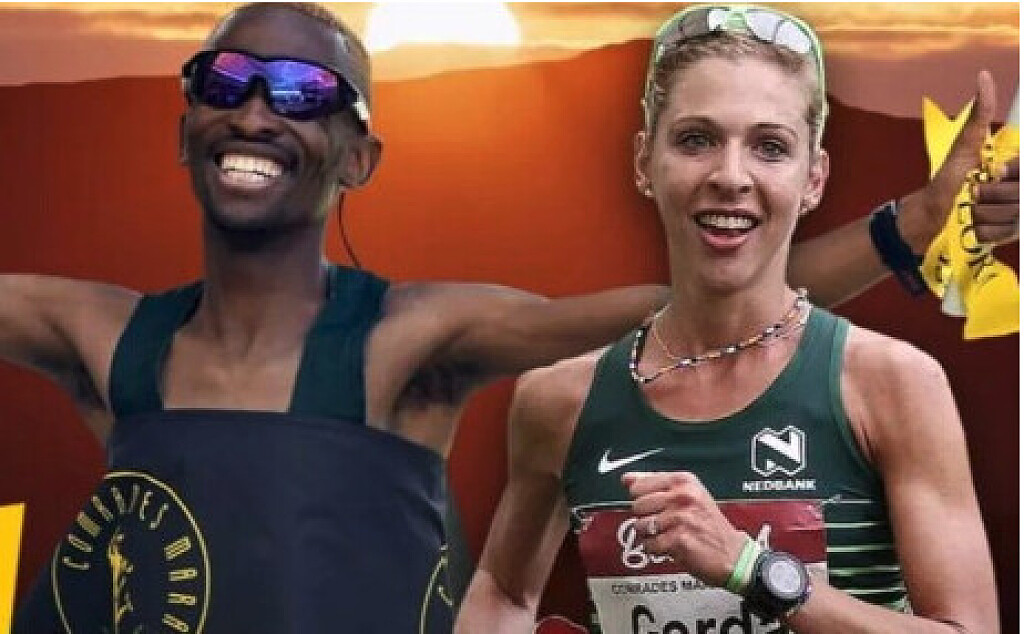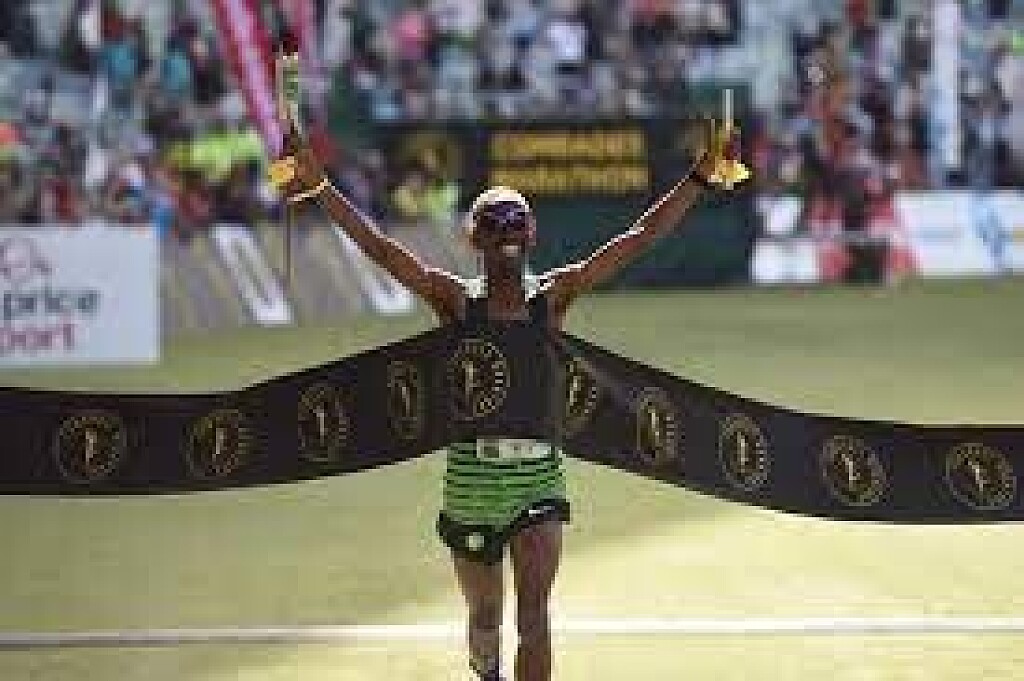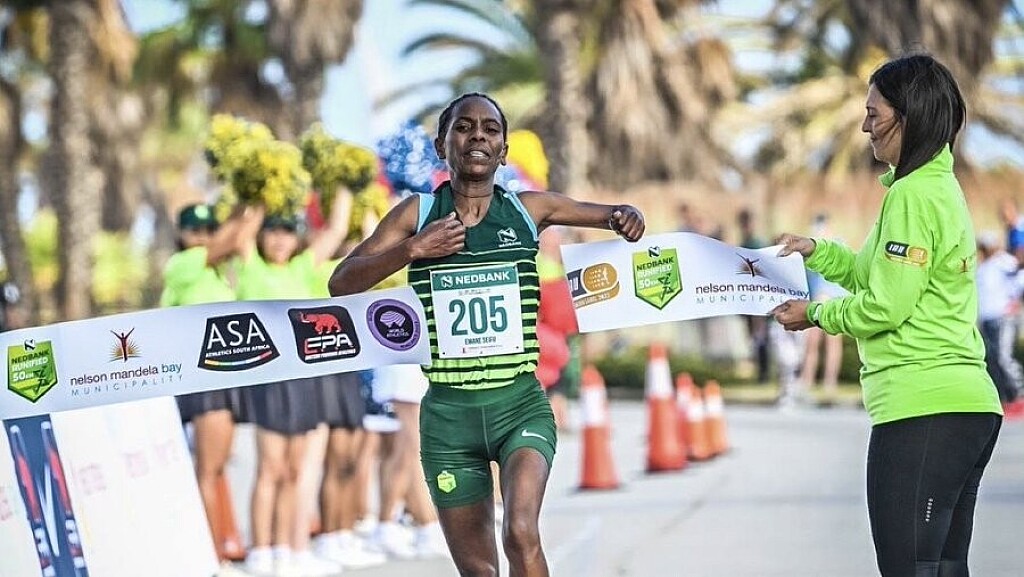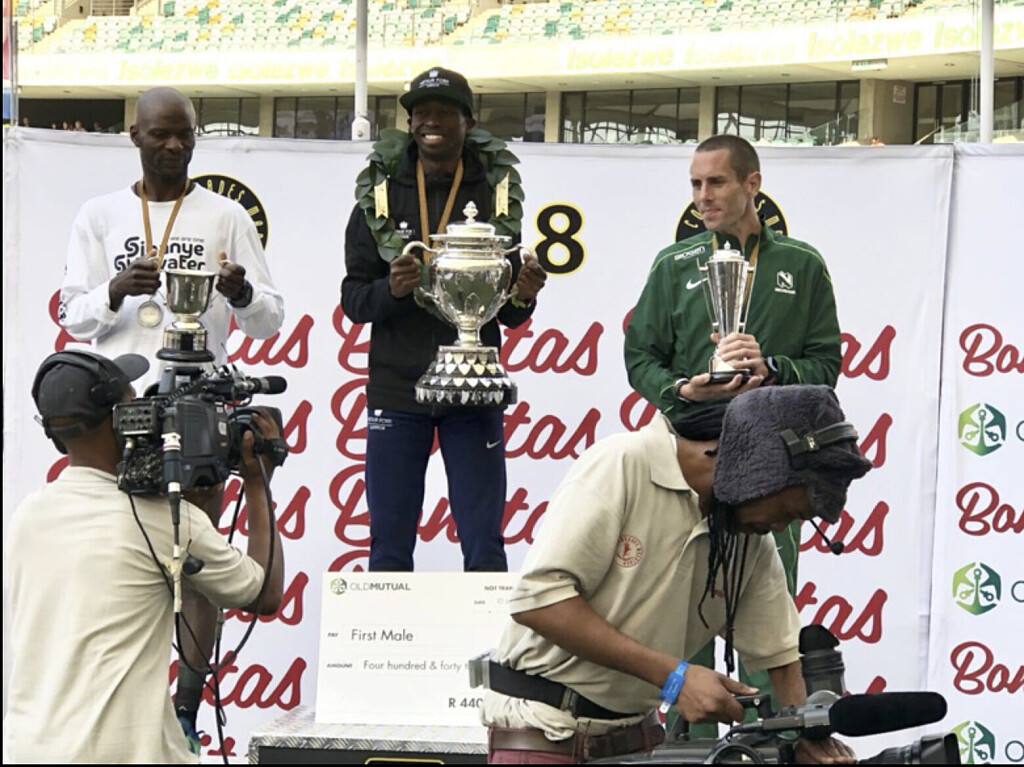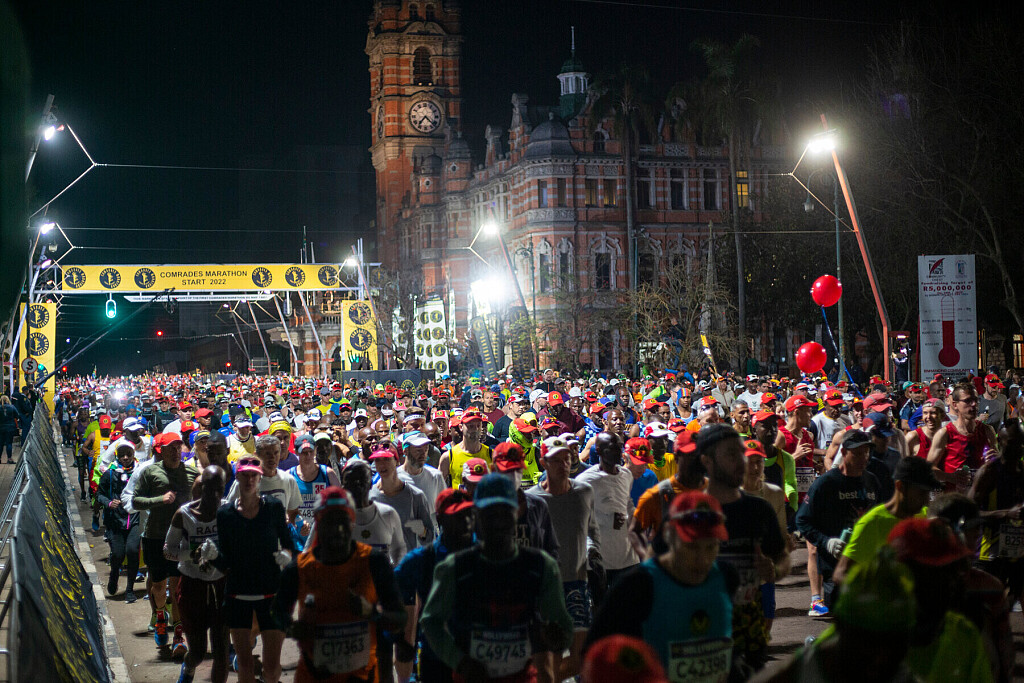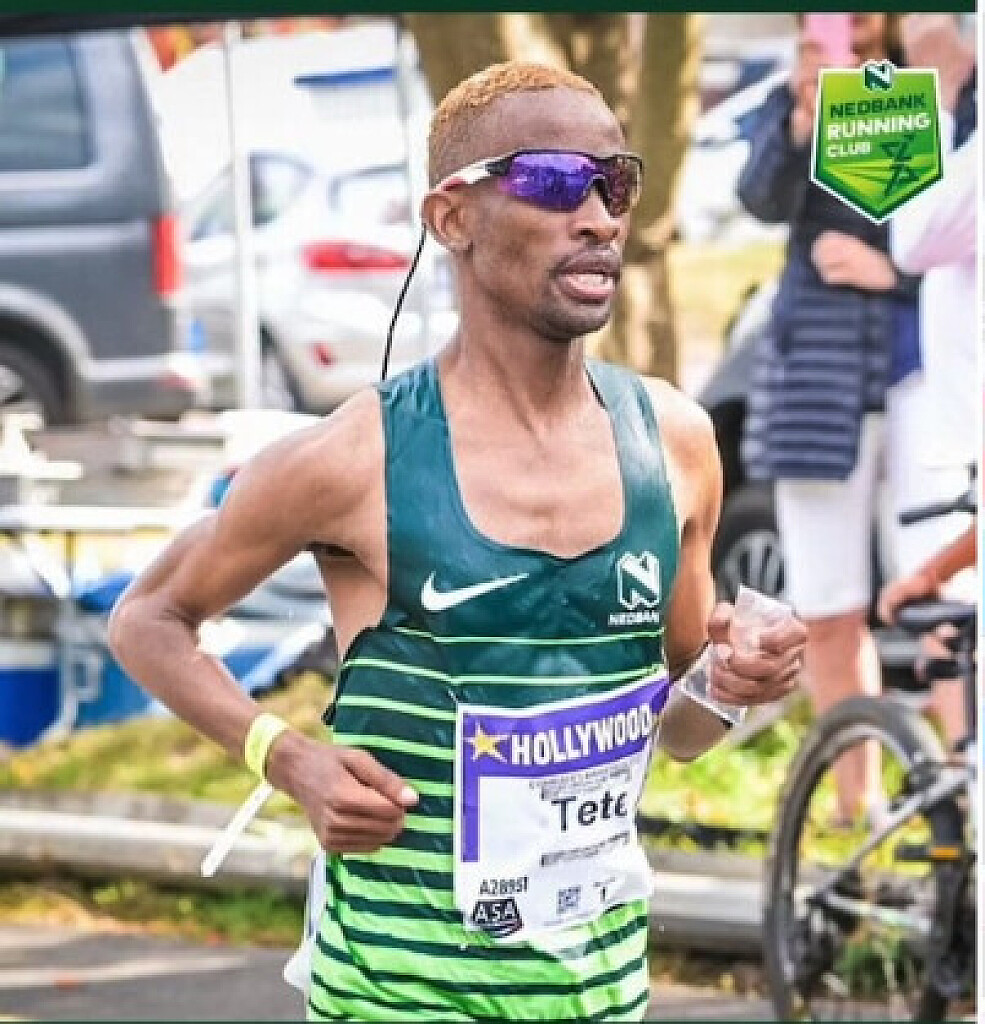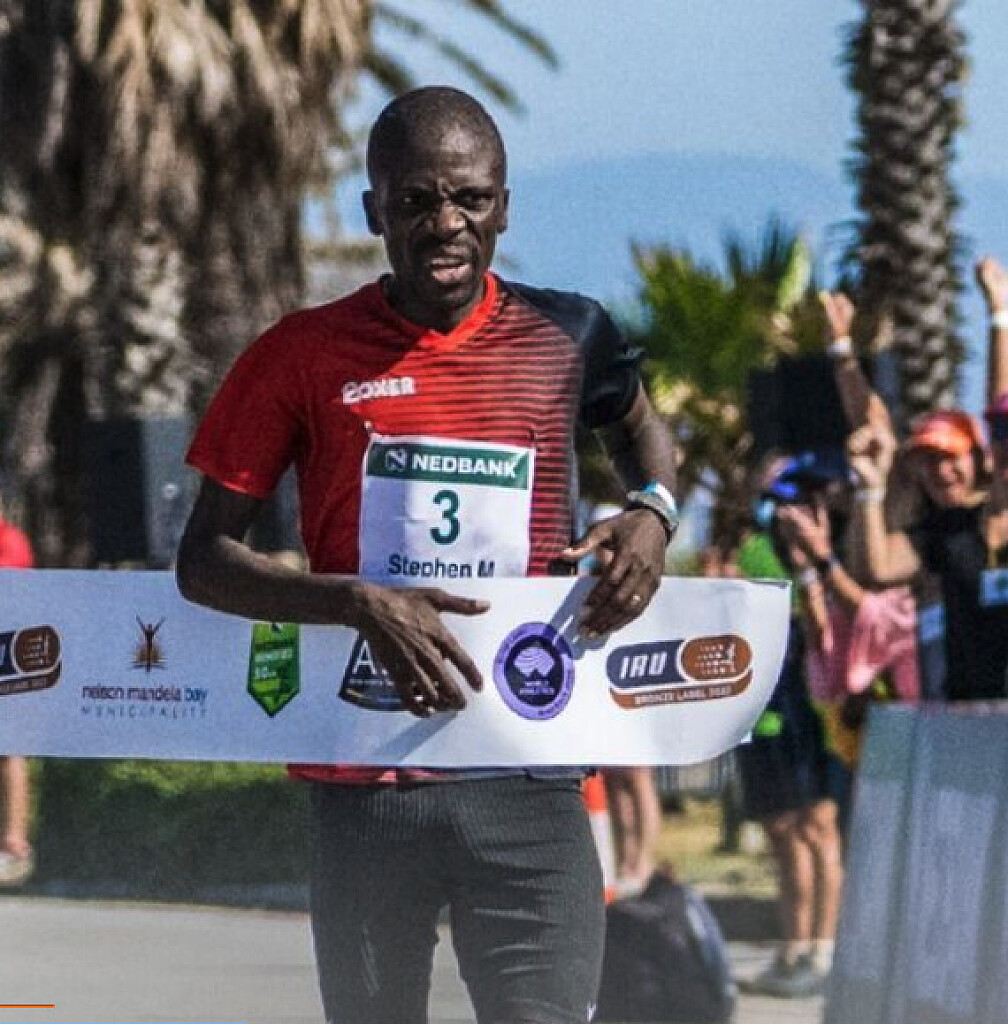Running News Daily
Running News Daily is edited by Bob Anderson. Send your news items to bob@mybestruns.com Advertising opportunities available. Train the Kenyan Way at KATA Kenya and Portugal owned and operated by Bob Anderson. Be sure to catch our movie A Long Run the movie KATA Running Camps and KATA Potato Farms - 31 now open in Kenya! https://kata.ke/
Index to Daily Posts · Sign Up For Updates · Run The World Feed
Articles tagged #Tete Dijana
Today's Running News
Dijana and Steyn Triumph Again at 2025 Comrades Marathon
South African stars Tete Dijana and Gerda Steyn solidified their places among the world’s best ultra runners with commanding victories at the 2025 Comrades Marathon, held Sunday, June 8. Dijana, now a three-time champion, won the men’s race in 5:25:27, edging out defending champion Piet Wiersma by just five seconds in a thrilling repeat of last year’s finish.
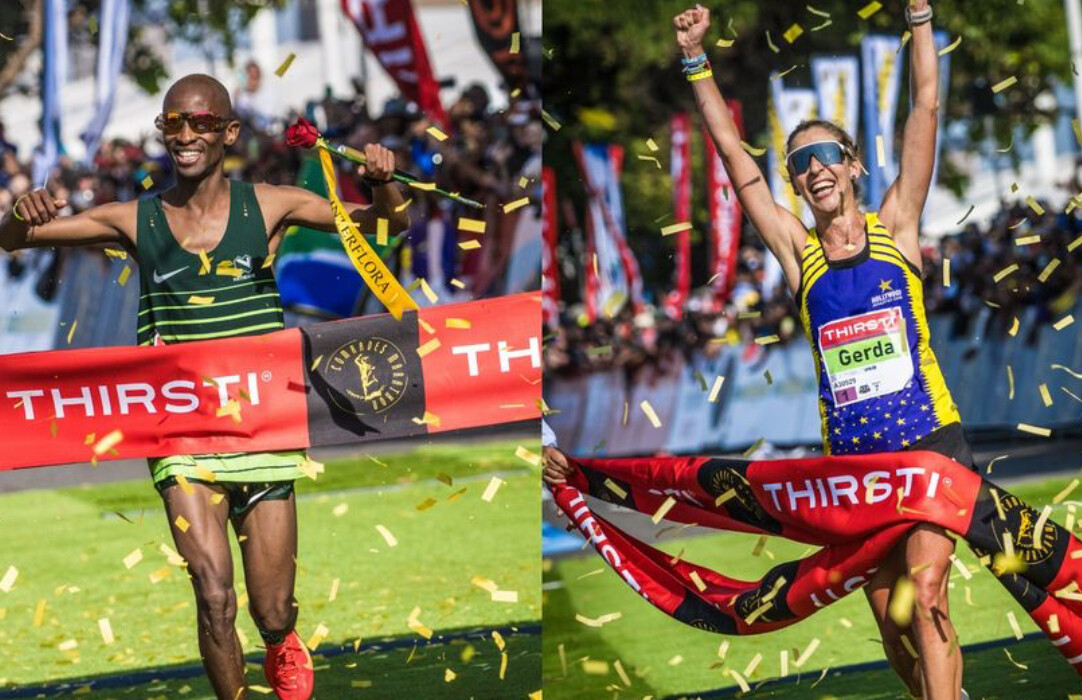
Steyn claimed her fourth Comrades title, joining elite company as only the second woman to win the race more than three times. Her time of 5:51:18 put her nearly five minutes ahead of runner-up Alexandra Morozova.
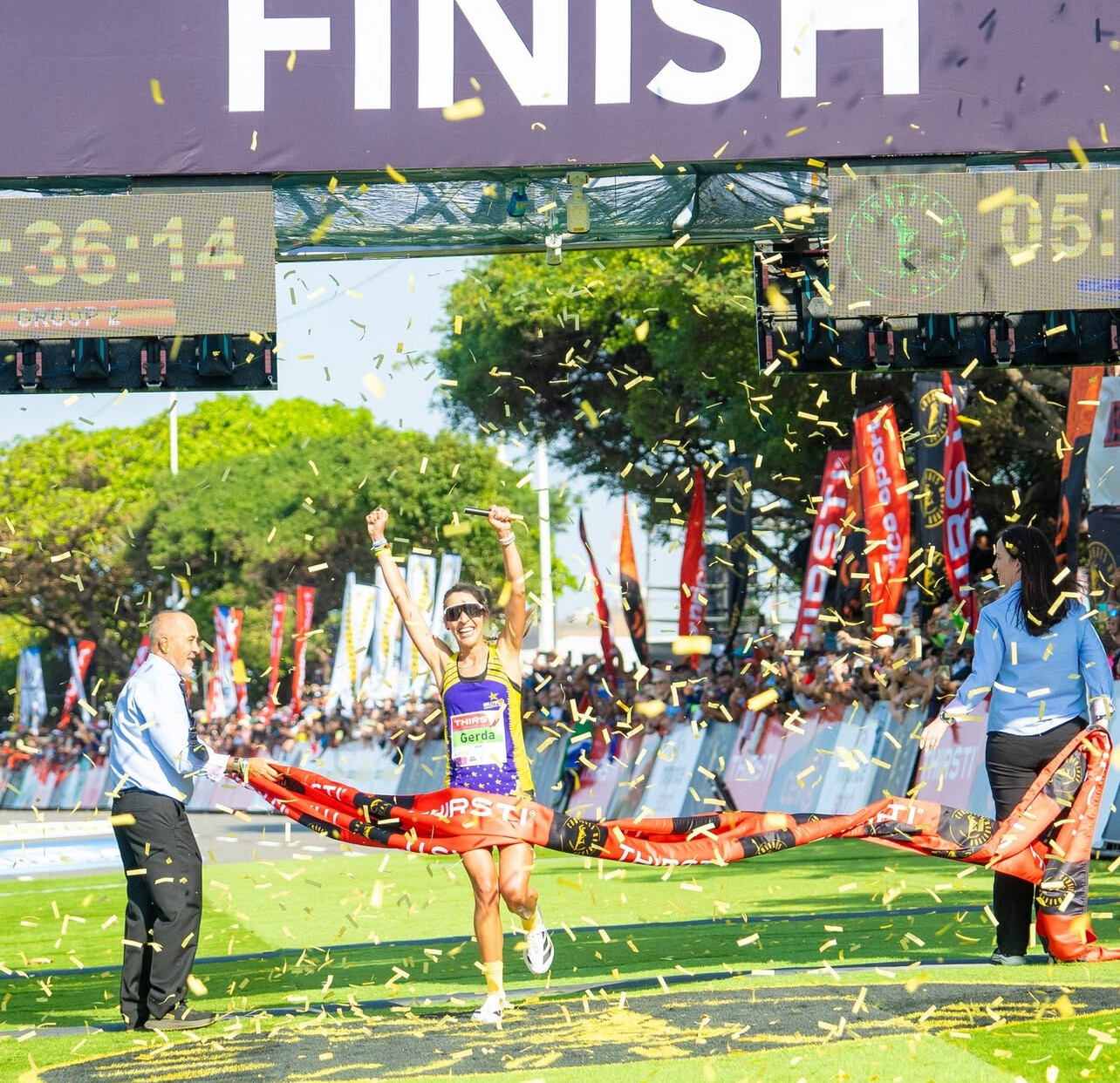
Race Distance and Pace
• Distance: 89.98 kilometers (55.9 miles)
• Tete Dijana’s average pace:
• 3:37 per km
• 5:50 per mile
• Gerda Steyn’s average pace:
• 3:54 per km
• 6:17 per mile
Innovations and Historic Field
The 98th edition of the Comrades, run from Pietermaritzburg to Durban, featured a record Down Run field of 22,677 qualified entrants. For the first time in event history, organizers introduced a split start for safety and improved flow, with two groups starting 15 minutes apart.
The new finish line on Masabalala Yengwa Avenue, adjacent to Durban’s People’s Park, added a festive atmosphere with expanded hospitality and club support zones.
Elite Race Highlights
In the men’s race, Onalenna Khonkhobe led early before Dijana surged with 20km to go. Dutchman Piet Wiersma closed the gap late, but Dijana stayed strong to win in a near repeat of 2023.
“I came prepared and stuck to my race plan. When I saw Piet closing, I pushed and opened the gap,” said Dijana.
Nikolai Volkov finished third in 5:29:41, followed by Edward Mothibi and Joseph Manyedi. South Africans claimed six of the top 10 spots.
In the women’s race, Elizabeth Mukoloma led early, but once Steyn took over, the outcome was never in doubt. Despite a late surge from Morozova, Steyn pushed ahead to win by nearly five minutes.
“It’s always an honor to be part of this race. I ran conservatively early to run my best race today—and it paid off,” said Steyn.
Kenya’s Shelmith Muriuki, in her Comrades debut, finished third, while Olympic marathoner Irvette van Zyl impressed with a strong fourth-place debut.
Building Toward the 100th
Comrades General Manager Alain Dalais praised the success of this “dress rehearsal” for the 100th edition in 2027:
“We’re thrilled with how well the split start worked and with the positive feedback on the new finish zone. We’re on the right path.”
Dalais also celebrated personal milestones, including Louis Massyn’s 50th Comrades finish, making him the first runner to earn a Quintuple Green Number.
Top Finishers
Men’s Top 3:
1. Tete Dijana – 5:25:27
2. Piet Wiersma – 5:25:32
3. Nikolai Volkov – 5:29:41
Women’s Top 3:
1. Gerda Steyn – 5:51:18
2. Alexandra Morozova – 5:55:55
3. Shelmith Muriuki – 6:07:55
by Boris Baron
Login to leave a comment
Comrades Marathon
Arguably the greatest ultra marathon in the world where athletes come from all over the world to combine muscle and mental strength to conquer the approx 90kilometers between the cities of Pietermaritzburg and Durban, the event owes its beginnings to the vision of one man, World War I veteran Vic Clapham. A soldier, a dreamer, who had campaigned in East...
more...Comrades Marathon Returns in 2025 for Another Unforgettable Chapter in South Africa
The world’s most iconic ultramarathon is set to captivate once again. On Sunday, June 8, thousands of runners will gather in South Africa for the 96th edition of the Comrades Marathon, a race that continues to define endurance, resilience, and tradition.
Held between the cities of Pietermaritzburg and Durban, this year’s event is a “down run,” covering approximately 87.7 kilometers (54.5 miles) with a net descent toward the finish at Kingsmead Stadium. But don’t be fooled—this course remains one of the most challenging tests in distance running, with punishing hills and unpredictable weather adding to the drama.
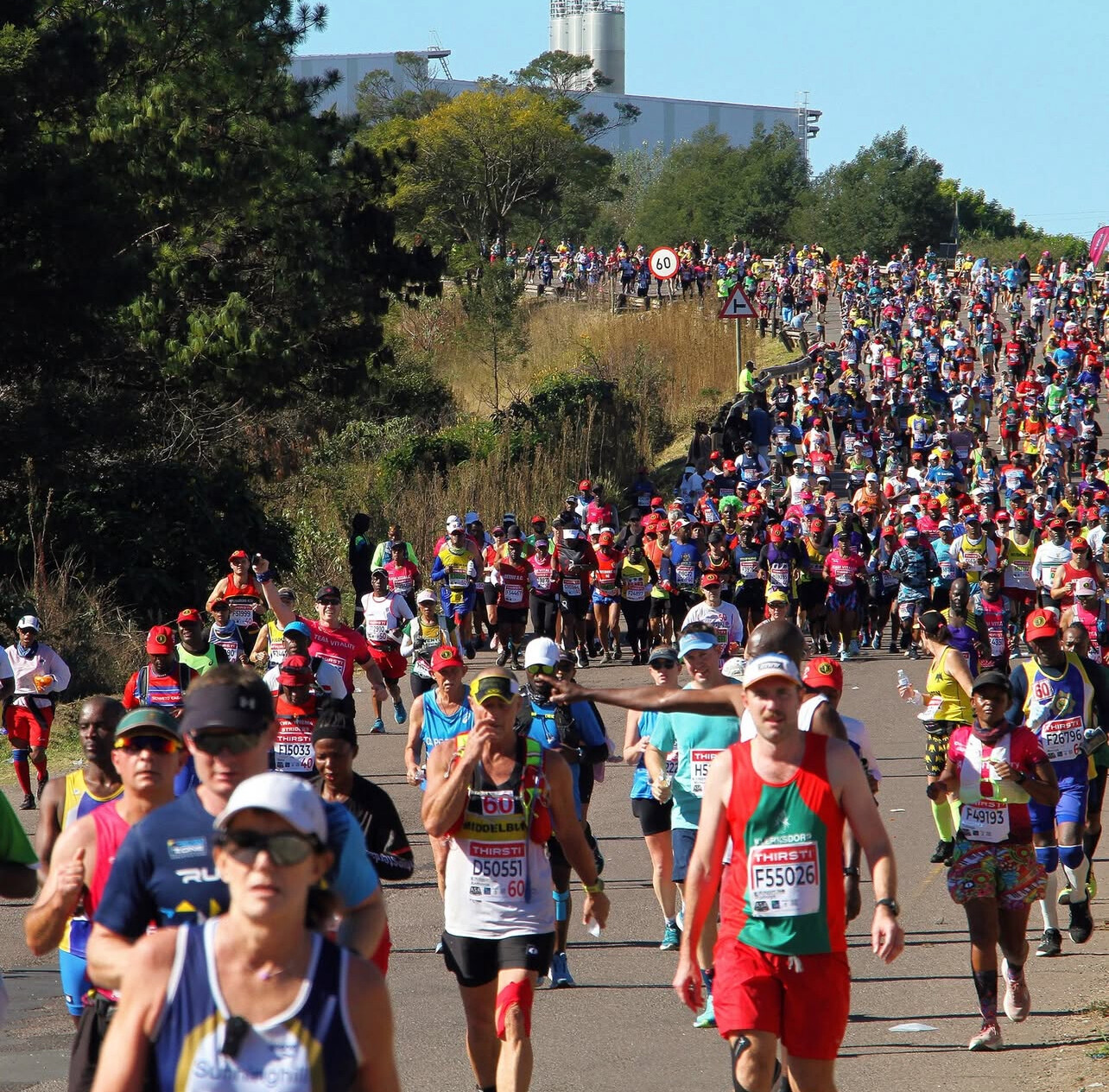
The Comrades Marathon is far more than a race. It’s a cultural phenomenon that draws over 20,000 runners from around the globe and inspires millions more who line the course or tune in from afar. From elite athletes chasing gold to first-timers fighting for a 12-hour finish, every participant adds a chapter to this legendary story.
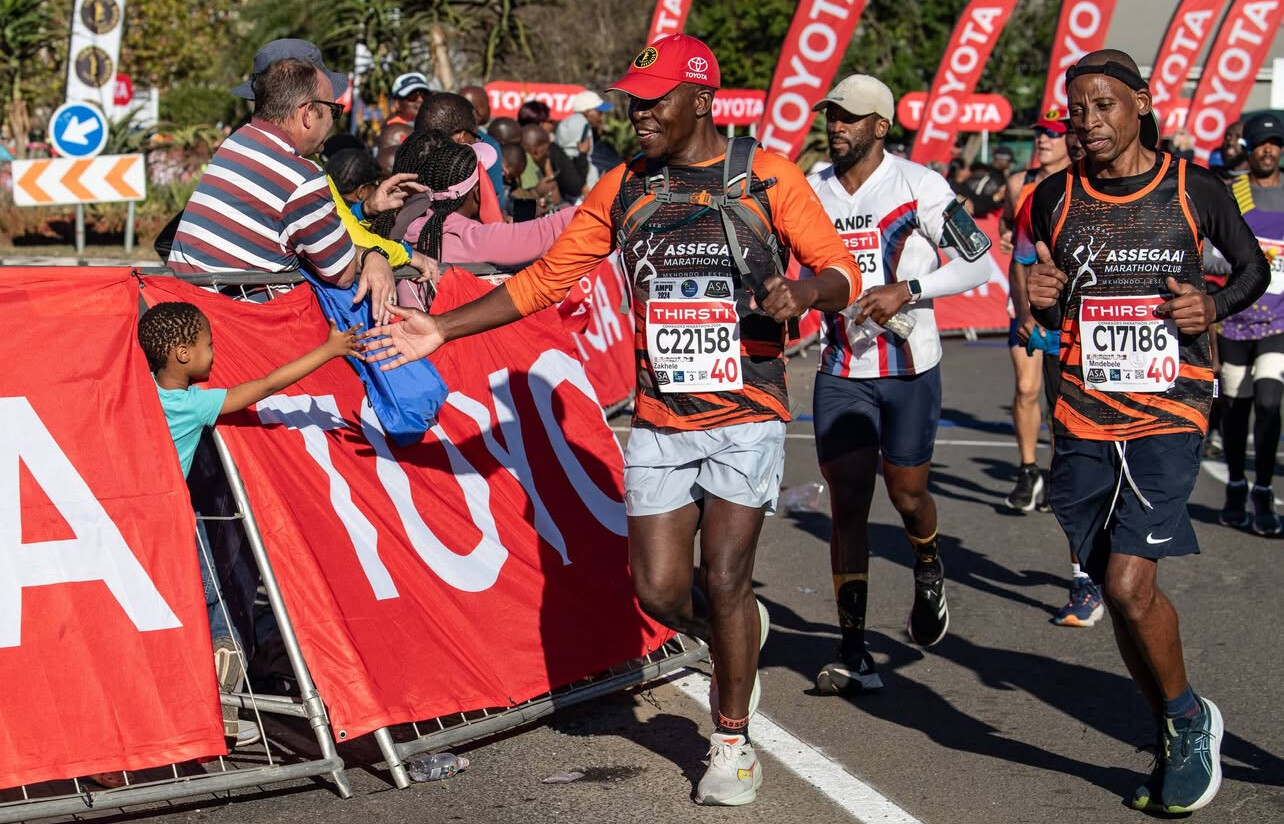
To complete the 2025 Comrades Marathon within the strict 12-hour cutoff, runners must maintain an average pace of approximately 13 minutes and 19 seconds per mile, or 8 minutes and 17 seconds per kilometer, across the 87-kilometer (54.06-mile) course. While this may seem manageable to experienced marathoners, the Comrades route—with its relentless hills, varying terrain, and heat—makes even this pace a serious challenge. Consistent pacing, smart energy management, and mental toughness are crucial to reaching Kingsmead Stadium before the final gun signals the end of the race.
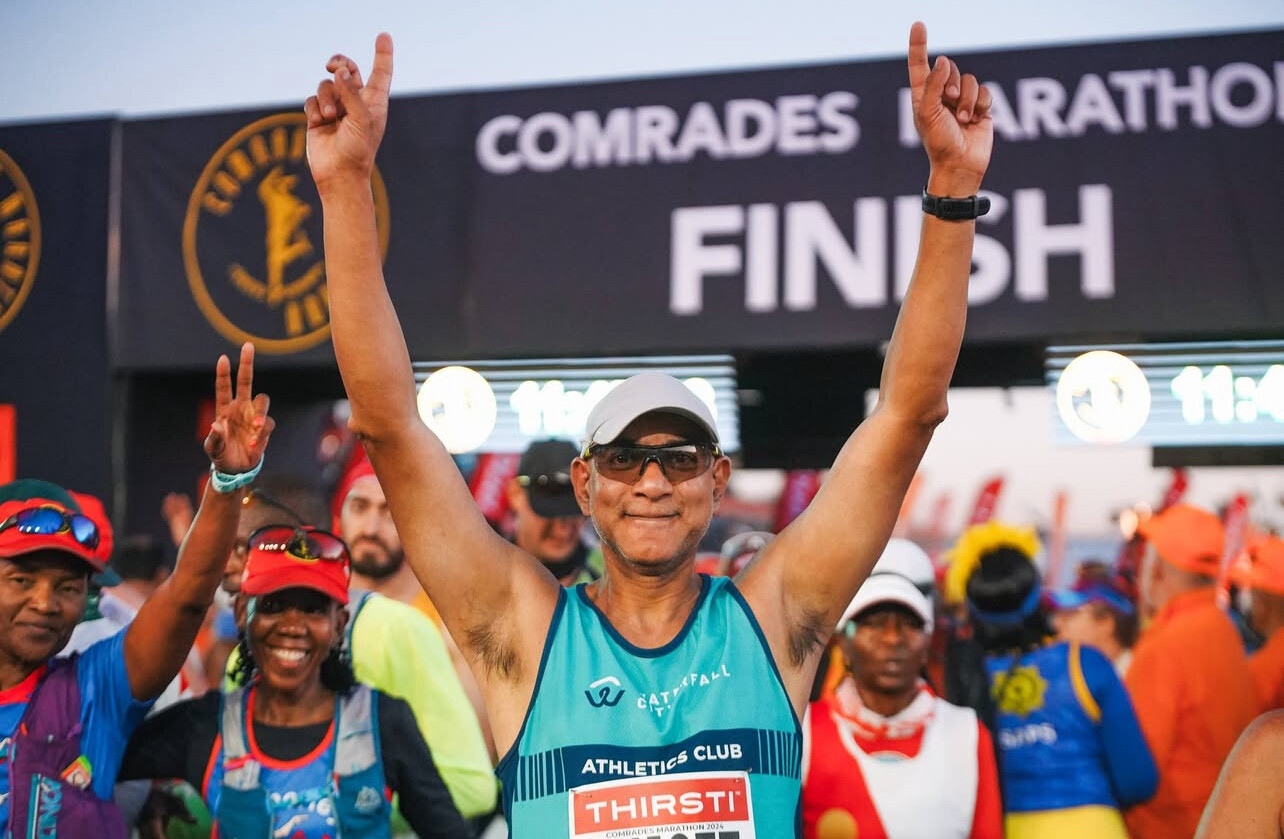
South Africa’s own Gerda Steyn, who smashed the women’s down run record in 2023 with a time of 5:44:54, is expected to return as a favorite. On the men’s side, all eyes are on Tete Dijana, the two-time champion looking to bounce back after a tough showing in 2024. International contenders will also line up, eager to challenge the homegrown champions on their turf.
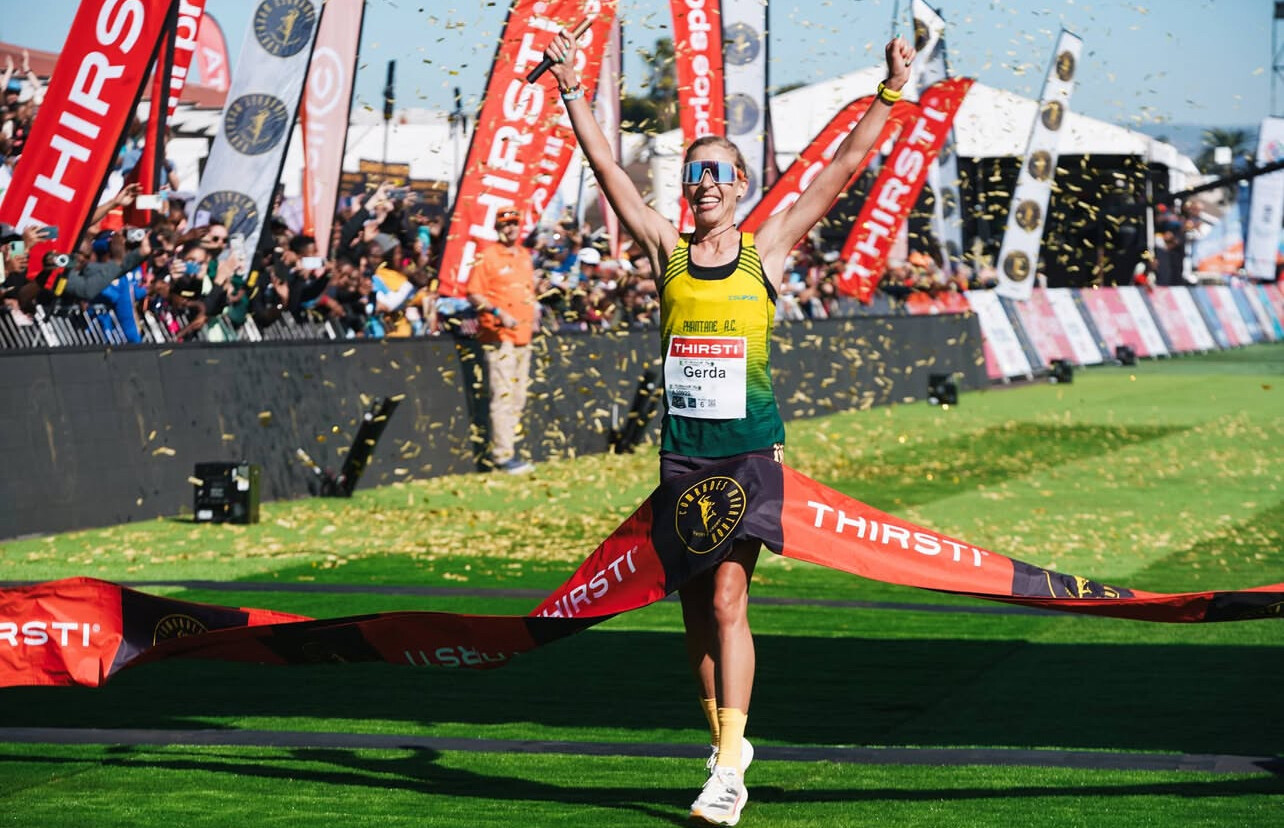
The Comrades is known for its strict 12-hour cutoff, and it’s often the final moments—when exhausted runners sprint or crawl to beat the clock—that leave the most lasting impressions. Medals are earned not just through speed, but through heart.
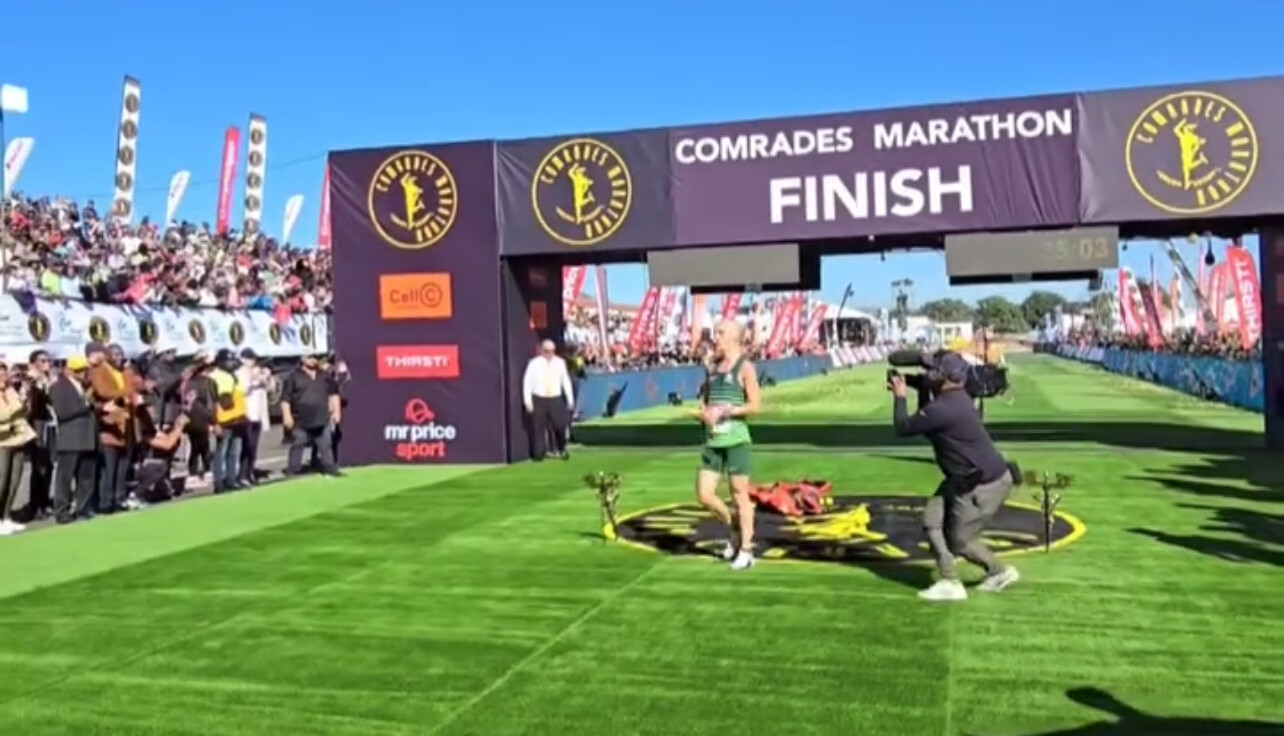
The course, supported by cheering crowds and rich traditions, includes notable landmarks like Polly Shortts Hill, Inchanga, and the halfway mark at Drummond. Local spectators offer music, support, and refreshments, creating an atmosphere like no other in distance running.
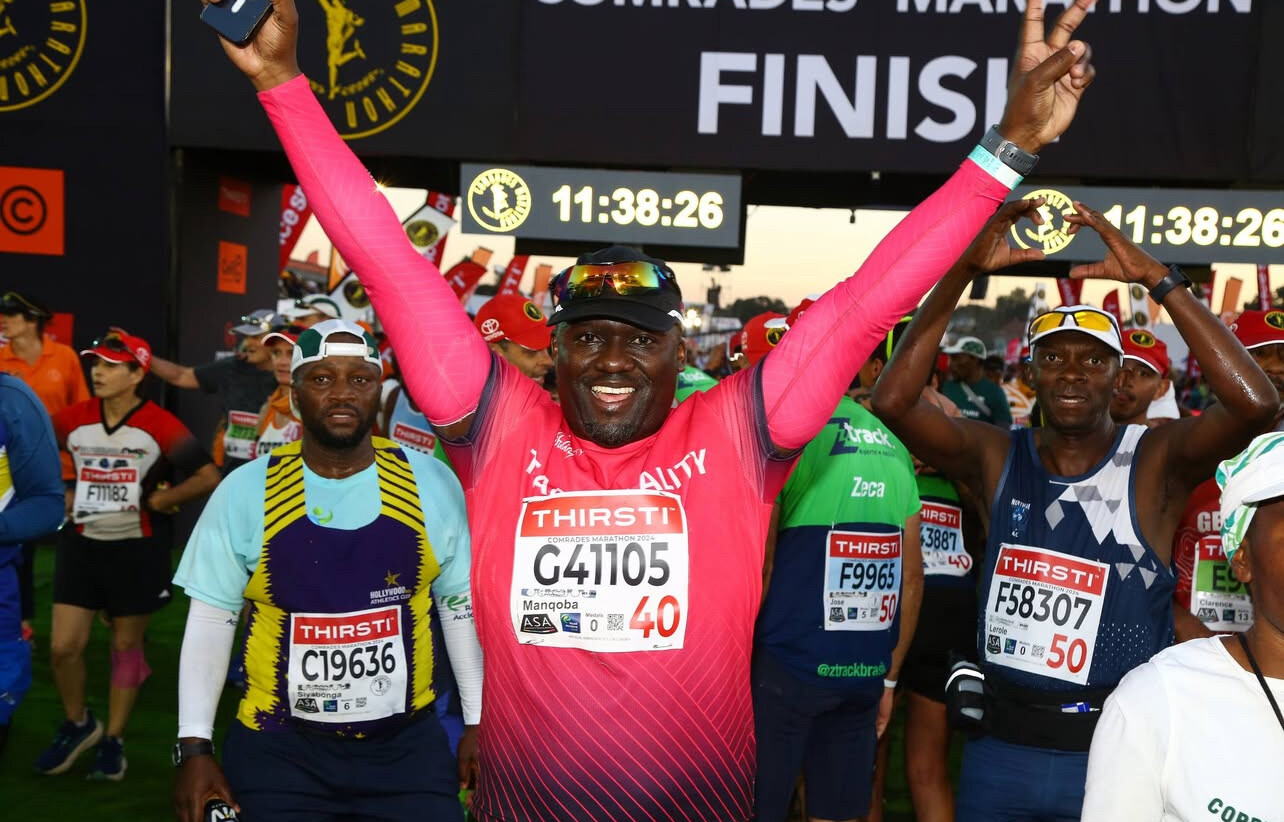
Whether you’re chasing a personal best, a gold medal, or simply the finish line, the 2025 Comrades Marathon promises to be another unforgettable day in the global running calendar.
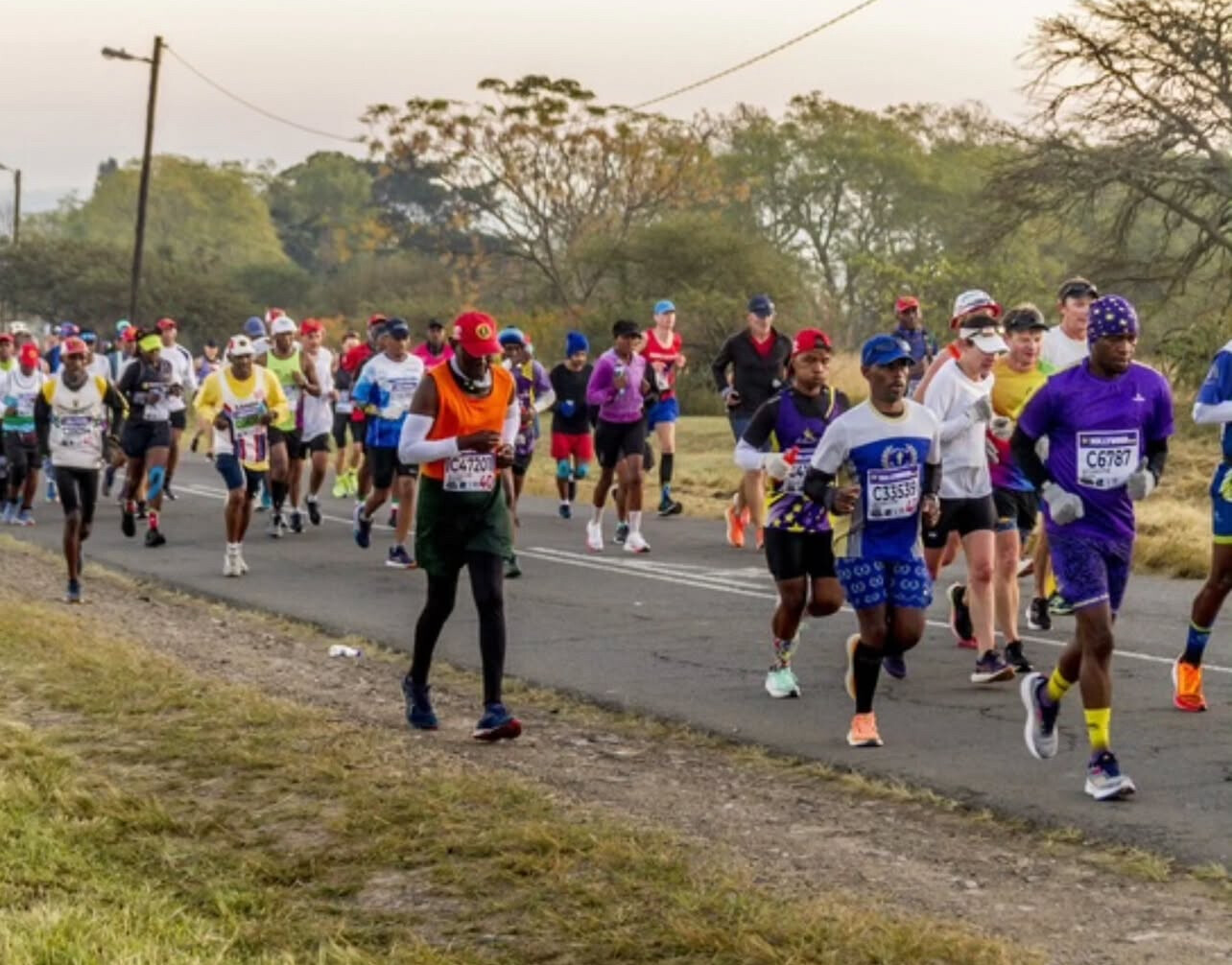
by Boris Baron
Login to leave a comment
Comrades Marathon
Arguably the greatest ultra marathon in the world where athletes come from all over the world to combine muscle and mental strength to conquer the approx 90kilometers between the cities of Pietermaritzburg and Durban, the event owes its beginnings to the vision of one man, World War I veteran Vic Clapham. A soldier, a dreamer, who had campaigned in East...
more...Comrades Marathon: Gerda Steyn Sets Course Record; Piet Wiersma Wins Men’s Race
At the 2024 Comrades Marathon, South African Gerda Steyn sets a course record in her third win while Dutchman Piet Wiersma gets his first victory.
At 5:30 a.m. on Sunday, June 9, in the raucous darkness of Durban, South Africa, more than 20,000 runners, powered by nerves, adrenaline, and the “Chariots of Fire” theme song, crossed the start line of the 2024 Comrades Marathon to take part in the oldest and largest ultramarathon in the world: nearly 86 kilometers of road running throughout the hills of South Africa’s KwaZulu-Natal province. It was the 97th running of the event, which has only missed four editions since World War I veteran Vic Clapham started it in 1921 to commemorate the lives of South African soldiers.
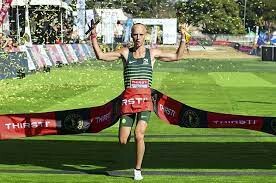
Two of the runners — Gerda Steyn, of South Africa but who lives in the United Arab Emirates, on the women’s side and Piet Wiersma of The Netherlands on the men’s — cemented their names in race lore by taking home wins, and sizable paydays, in their respective races. The race has a massive prize purse, with a total 4,092,000 Rand ($217,000) on the line.
Steyn, the defending champion, broke her own course record for the Up run direction by more than nine minutes for her third win at Comrades. She also holds the women’s course record for the Down run when the race is held in the opposite direction, which she set in 2023.
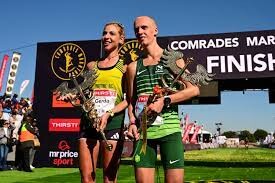
Wiersma, meanwhile, backed up his impressive Comrades debut last year — where he finished second only three seconds behind the winner — with his first win at the race.
The Comrades Marathon famously alternates the direction each year, and this year’s race, which was run in relatively ideal conditions with temperatures ranging from the mid-50s to low-70s Fahrenheit, was the 49th Up race, meaning runners began in the lower-altitude Durban and ended in the higher-altitude Pietermaritzburg. The race featured around 1,750 meters of elevation gain, with most of it during the first half of the race, when the course runs through three of its “Big Five” hills. The Up run, therefore, demands a smart, measured racing strategy.
For the race’s first half, Piet Wiersma (The Netherlands) seemed content to stay conservative and save his energy for the back half. A two-man pack of Jobo Khatoane (Lesotho), looking for his first Comrades finish, and Aleksei Beresnev (Russia), back for a second time after debuting inside the top 10 last year, were within a minute of each other at Drummond, around the halfway mark, with the next runner more than five minutes back and Wiersma sitting in 10th, almost nine-and-a-half minutes off the lead.
But then Wiersma dropped the hammer, increasing his pace to 3:37 per kilometer from 3:58 per kilometer to jump into the top five by the Cato Ridge checkpoint at 56.6 kilometers into the race. That seemingly set the tone for big moves for the race’s second half, where Beresnev was still holding the lead and followed by Degefa Yohannese Lafebo (Ethiopia). With this race, Lafebo was moving up in distance following two top-10 finishes at the Two Oceans Marathon, a 50k race.
South Africans Tete Dijana, the two-time defending champion, and Dan Moselakwe, a prior Comrades podium finisher, sat in third and fourth, respectively.
Wiersma continued to run strong and moved into the lead by Umlaas Road, 67.5k, passing Lafebo, and by Mkondeni at 79.1k, he had increased to nearly a minute. Behind him, Beresnev dropped off the pace, while Dijana couldn’t hang on, either. The pair would finish, but outside the top 10 this year.
Moselakwe took advantage of fading runners to move himself into second. Joseph Manyedi (South Africa), meanwhile, methodically moved his way up to finish in fourth, his eighth and best Comrades finish, while Andrew Davies (U.K.) jumped from 12th to fifth over the course of the second half of the race. This was Davies’ first Comrades finish.
At the finish line, Wiersma would stay clear of Moselakwe by 45 seconds and third-place finisher Lafebo by nearly three minutes.
by Robbie Harms
Login to leave a comment
Comrades Marathon
Arguably the greatest ultra marathon in the world where athletes come from all over the world to combine muscle and mental strength to conquer the approx 90kilometers between the cities of Pietermaritzburg and Durban, the event owes its beginnings to the vision of one man, World War I veteran Vic Clapham. A soldier, a dreamer, who had campaigned in East...
more...81-year-old bricklayer becomes Comrades Marathon’s oldest finisher
An 81-year-old bricklayer has become the oldest person to complete South Africa’s storied Comrades Marathon, finishing this year’s 87.7-km run from Pietermaritzburg to Durban in 9:26:10.
Sunday’s history-making run by Johannes Mosehla, who hails from the South African city of Polokwane, marked the 10th time the speedy senior has completed the Comrades Marathon, the world’s largest ultra-marathon. According to comments Mosehla made at Monday’s awards breakfast at Durban’s Elangeni Hotel on Monday, this year’s Comrades won’t be his last.
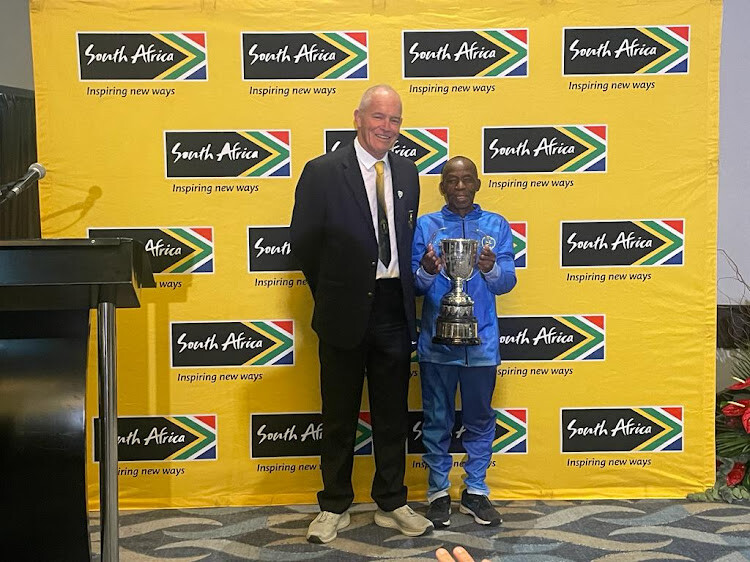
“I feel strong,” South Africa’s news24 reported Mosehla as saying. “I could run it again!” he added, confirming that he plans to return to Comrades in 2024.
He told those at the breakfast that there are no shortcuts to becoming Comrades’ oldest finisher: “My secret is to train. You can’t win without training,” said Mosehla, who has been running since 1963 and continues to train three times a week, covering distances from five to 32 km.
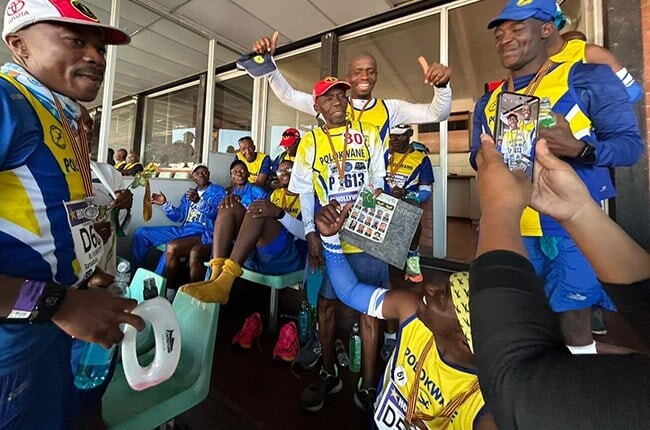
Comrades alternates between the “down” course, which was run this year and is so-named for its relative descent in elevation, and the “up” course, which begins in Durban and ends in Pietermaritzburg.
Noting he was proud to pull off his record-breaking effort “for the whole country,” Mosehla said he hopes his run sends the message that people “must not look for a number or age. I am 81, but I must not look at that number. I must be controlled by my body. When I am still strong, I must not look at my age.”
Mosehla’s run broke the decades-old record set by Comrades legend Wally Hayward, who at age 80 crossed the finish line of the 1989 Comrades Marathon less than two minutes before the 11-hour cutoff time.
Hawyard’s wasn’t the only record to fall at Sunday’s race. Last year’s winner, Tete Dijana of Rustenburg, South Africa, defended his Comrades crown in 5:13:58, shaving more than four minutes off the “down” record set by David Gatebe in 2016.
Gerda Steyn ran this year’s course in 5:44:56, breaking the women’s “down” record set by fellow South African runner Frith van der Merwe in 1989 by nearly 10 minutes.
by Paul Baswick
Login to leave a comment
Comrades Marathon
Arguably the greatest ultra marathon in the world where athletes come from all over the world to combine muscle and mental strength to conquer the approx 90kilometers between the cities of Pietermaritzburg and Durban, the event owes its beginnings to the vision of one man, World War I veteran Vic Clapham. A soldier, a dreamer, who had campaigned in East...
more...RECORD-BREAKING WINS FOR TETE DIJANA AND GERDA STEYN AT 2023 COMRADES MARATHON
Dijana stripped more than four minutes off David Gatebe’s best time of 5:18:19, in 2019, while Steyn broke a 1989 record which was held by Frith van der Merwe.
Tete Dijana won the Comrades Marathon for the second consecutive year, with a record-breaking time of 5 hours, 13 minutes, and 58 seconds.
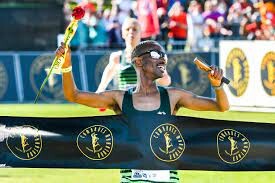
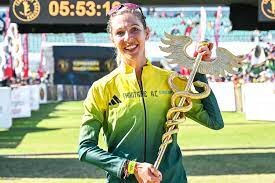
Dijana, who hails from the North West stripped more than four minutes off David Gatebe’s best time of 5:18:19, in 2019.
Meanwhile, Gerda Steyn won the women’s race of the 96th edition of the marathon, in a time of 5:44:56.
The Two Oceans winner also broke the down-run record, which was previously held by Frith van der Merwe in 1989 at a time of 5:54:43.
This year’s race was a downhill run from Pietermaritzburg to Durban, with about 17 000 runners taking part in the 87km race.
The Netherlands’ Piet Wiersma came in second, with Edward Mothibi taking the third spot in the men’s race, while Adele Broodryk came in second in the women’s race, with Carla Monilaro clinching the third. Prize money was awarded to the first ten men and women totaling $160,141US.
Login to leave a comment
Comrades Marathon
Arguably the greatest ultra marathon in the world where athletes come from all over the world to combine muscle and mental strength to conquer the approx 90kilometers between the cities of Pietermaritzburg and Durban, the event owes its beginnings to the vision of one man, World War I veteran Vic Clapham. A soldier, a dreamer, who had campaigned in East...
more...Tete Dijana looks to defend his crown at Comrades Marathon
The 2023 Comrades Marathon is nearly upon us, with thousands preparing to take on the down route from Pietermaritzburg to Durban.
This year’s race has an official race distance of 87.7km, as competitors race for victory in a number of prize categories – the men and women’s winners earning over €20,000.
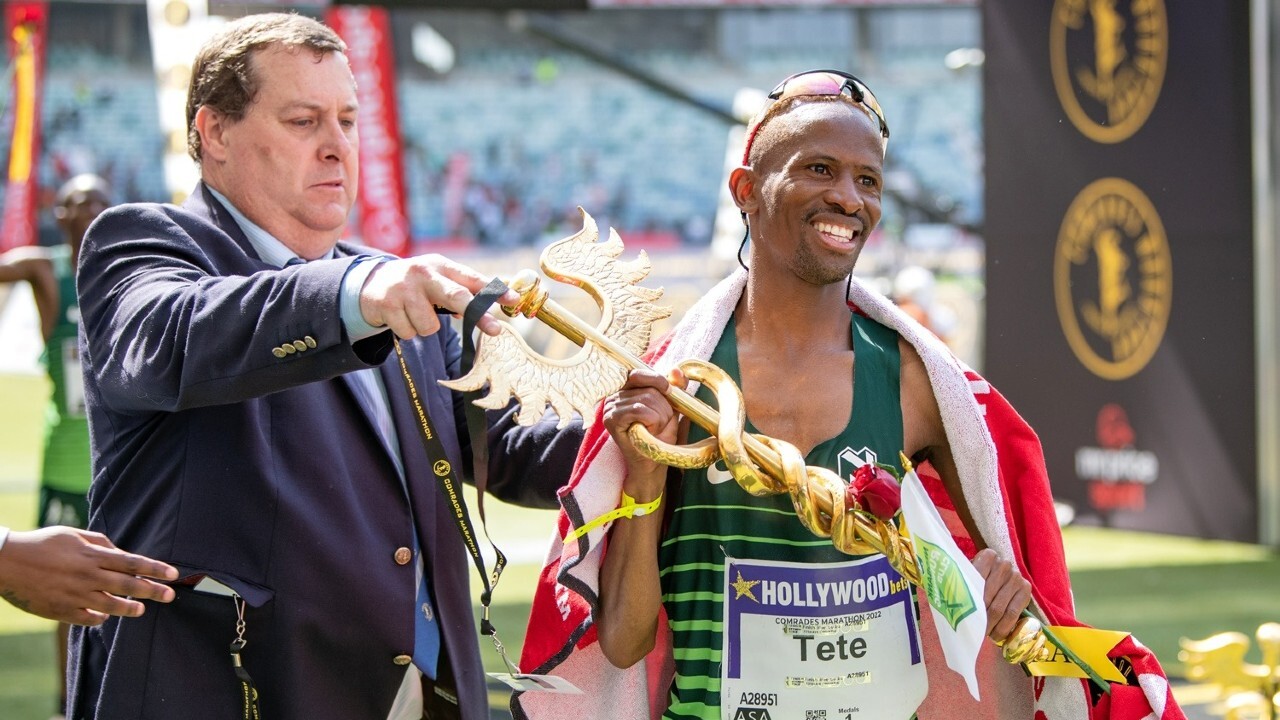
The men’s field this year features a number of past winners – as does the women’s – and promises to be an exciting race from start to finish.
Dijana aims to crown Nedbank again
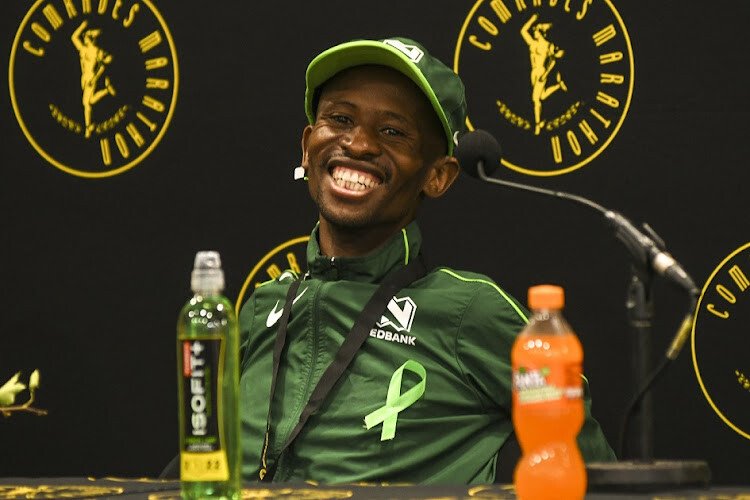
Last year saw five of the top seven finishers all come from the Nedbank running club, but it was Tete Dijana who proved chief amongst them.
He won last year’s race in a time of 5:30:38, with clubmate and 2019 winner Edward Mothibi three minutes behind him and Dan Matshailwe, another Nedbank runner, a further three minutes behind Mothibi.
Expect all those names to feature near the top three, with Nedbank set to work together once more to assert dominance over South Africa’s most famous ultra.
Perhaps the chief non-Nedbank competitor will be 2018 winner Bongmusa Mthembu. Fourth last year, he was the fastest non-Nedbank runner and has set himself more preparation time for the race this year, competing in the Om Die Dam 50km, which he won in 2:56:33.
He is a three time-winner at the Comrades Marathon, his first in 2014 when he was registered with Nedbank, and his other two coming in back-to-back wins in 2017 and 2018 for his current team Arthur Ford.
International talent
The last non-South African to win the race was Stephen Muzhingi, the Zimbabwean taking three titles in a row between 2009 and 2011, and it seems a tall order to expect anyone other than local runners to take the title.
But regardless, there are those who will be competing. British runner Shane Cliffe has finishers in the Lakes in a Day and The Grand Tour of Skiddaw to his name.
There’s also Simon Brown, who has run the Marathon des Sables and qualified for the cancelled Western States 100 in 2020, and experienced runner and coach Ian Sharman.
by Olly Green
Login to leave a comment
Comrades Marathon
Arguably the greatest ultra marathon in the world where athletes come from all over the world to combine muscle and mental strength to conquer the approx 90kilometers between the cities of Pietermaritzburg and Durban, the event owes its beginnings to the vision of one man, World War I veteran Vic Clapham. A soldier, a dreamer, who had campaigned in East...
more...Ethiopian runner breaks women-only world 50K record in South Africa
Ethiopia’s Emane Seifu Hayile broke the women-only 50K record at a race in South Africa on Sunday, running 3:00:29. Competing in the Nedbank Runified Breaking Barriers Ultramarathon in Gqeberha, a coastal South African city, Hayile shaved almost four full minutes off the previous women-only world record. She was less than a minute off American Des Linden‘s 50K women’s mixed-gender race world record of 2:59:54 from 2021.
Women-only races mean that there are no men in the field. Because of the potential benefit that female runners can receive while pacing off male athletes, World Athletics recognizes two types of records for road races, making it possible for Hayile’s 50K record to co-exist with the one belonging to Linden, which she ran alongside male pacers.
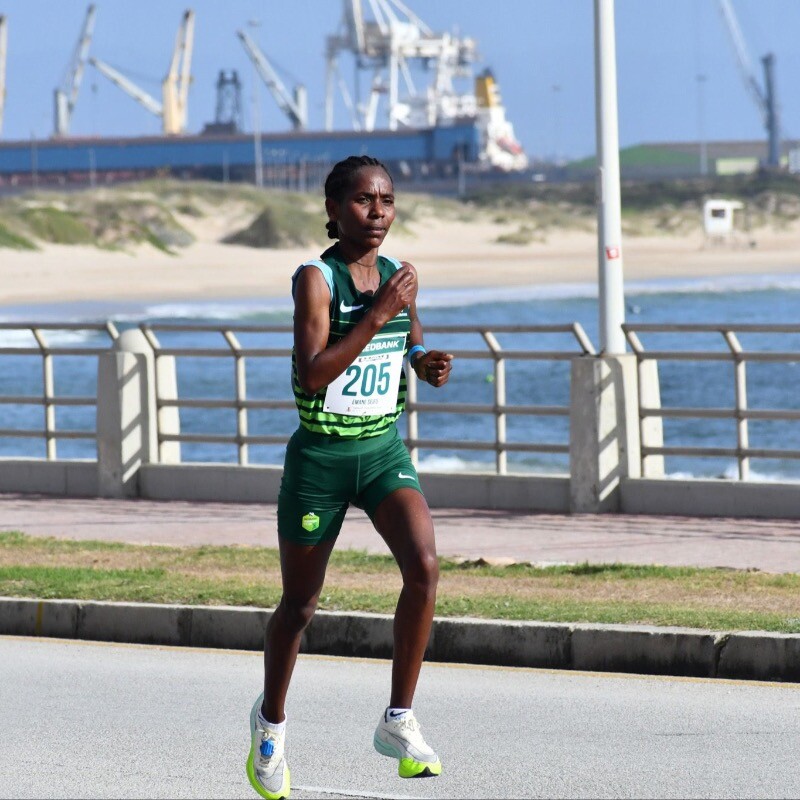
Despite running in a women-only race, Hayile came extremely close to claiming the outright 50K world record, finishing mere seconds behind Linden’s time. She ran with two fellow Ethiopians and a Swedish athlete in the opening stages of the race, passing through 10K in just over 36 minutes and 15K in 54. At around 20K, Hayile and her compatriots dropped the Swedish runner and carried on in a three-way battle. At the halfway mark, the trio clocked a split of 1:30:28, just shy of sub-three-hour pace.
Over the next 10K or so, Hayile dropped her two remaining challengers, and by the 40K checkpoint she was almost a minute ahead of second place. She clocked a 2:32 marathon and managed to accelerate as she neared the finish, crossing the line just north of three hours. Hayile won the race by six minutes and bettered the women-only record by four minutes.
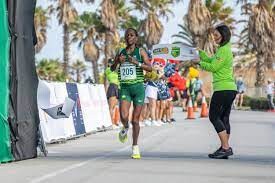
“I am lost for words and don’t know how to describe it,” Hayile told World Athletics after the race. “All in all, it was an exciting event. I’m very happy.”
In the men’s race, South Africa’s Tete Dijana ran a course record of 2:39:04. This result is the second-fastest 50K of all time, sitting just 20 seconds behind American CJ Albertson‘s world record of 2:38:44, which he ran in Oct. 2022.
by Ben Snider-McGrath
Login to leave a comment
Nine Comrades Marathon runners disqualified for cheating
Nine runners’ results have been disqualified from the 2022 Comrades Marathon following an investigation into alleged cheating during the race.
According to a statement by KwaZulu-Natal Athletics (KZNA), the provincial sport organization, the investigation found that nine athletes did not run the entire point-to-point 90 km course and allowed other athletes to run with their race bibs, while some provided incorrect qualification information.
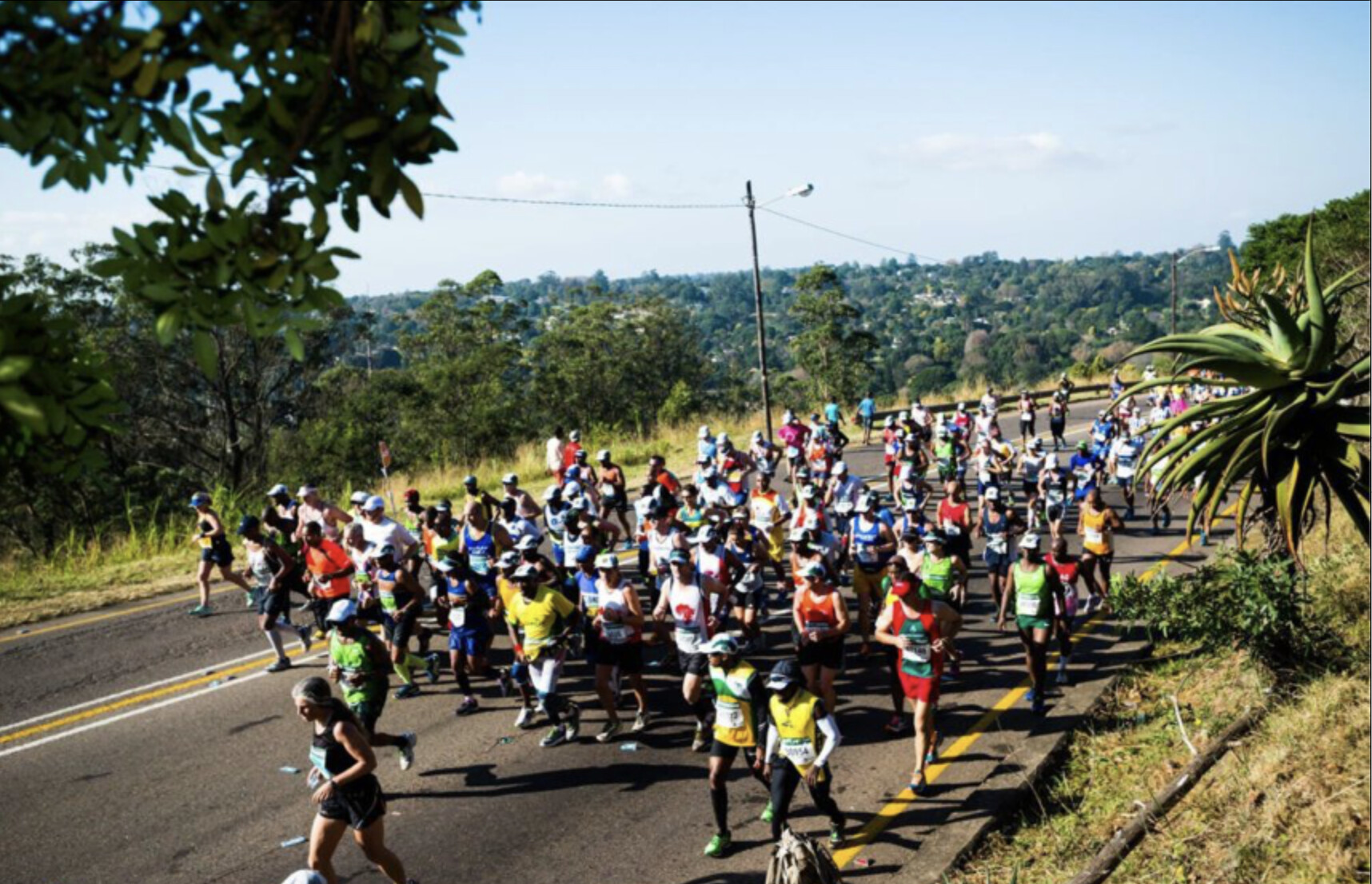
To qualify for the Comrades Marathon, entrants must run a marathon in less than four hours and 50 minutes.
All nine runners are required to return their 2022 Comrades Marathon medal and will be reported to their provincial athletics organization club, which has the right to apply additional disciplinary measures. These runners are prohibited from entering the Comrades Marathon in years to come, according to the Comrades Marathon Association.
According to a statement, this decision is intended to send a clear message to athletes that cheating will not be tolerated: “These investigations are in line with us standing up for the rules of the sport and not condoning cheating in any form,” said KZNA president Steve Mkasi.
Comrades is the largest and oldest ultramarathon in the world, comprising a 90 km route between Pietermaritzburg and Durban, South Africa, and usually alternates directions each year. This year’s race took place on Aug. 28 and was won by a full-time security guard and part-time marathoner, Tete Dijana.
by Running Magazine
Login to leave a comment
‘We Are Here Because of Him’: The Runner Who Defied Apartheid
In the dying days of South Africa’s apartheid regime, pioneering Black runners helped transform the Comrades Marathon into the race it is today, one that reflects the country around it.
On a balmy Sunday morning in late August, Kgadimonyane Hoseah Tjale stood below a stadium full of roaring fans on the finish line of the Comrades ultramarathon, clutching a small air horn.
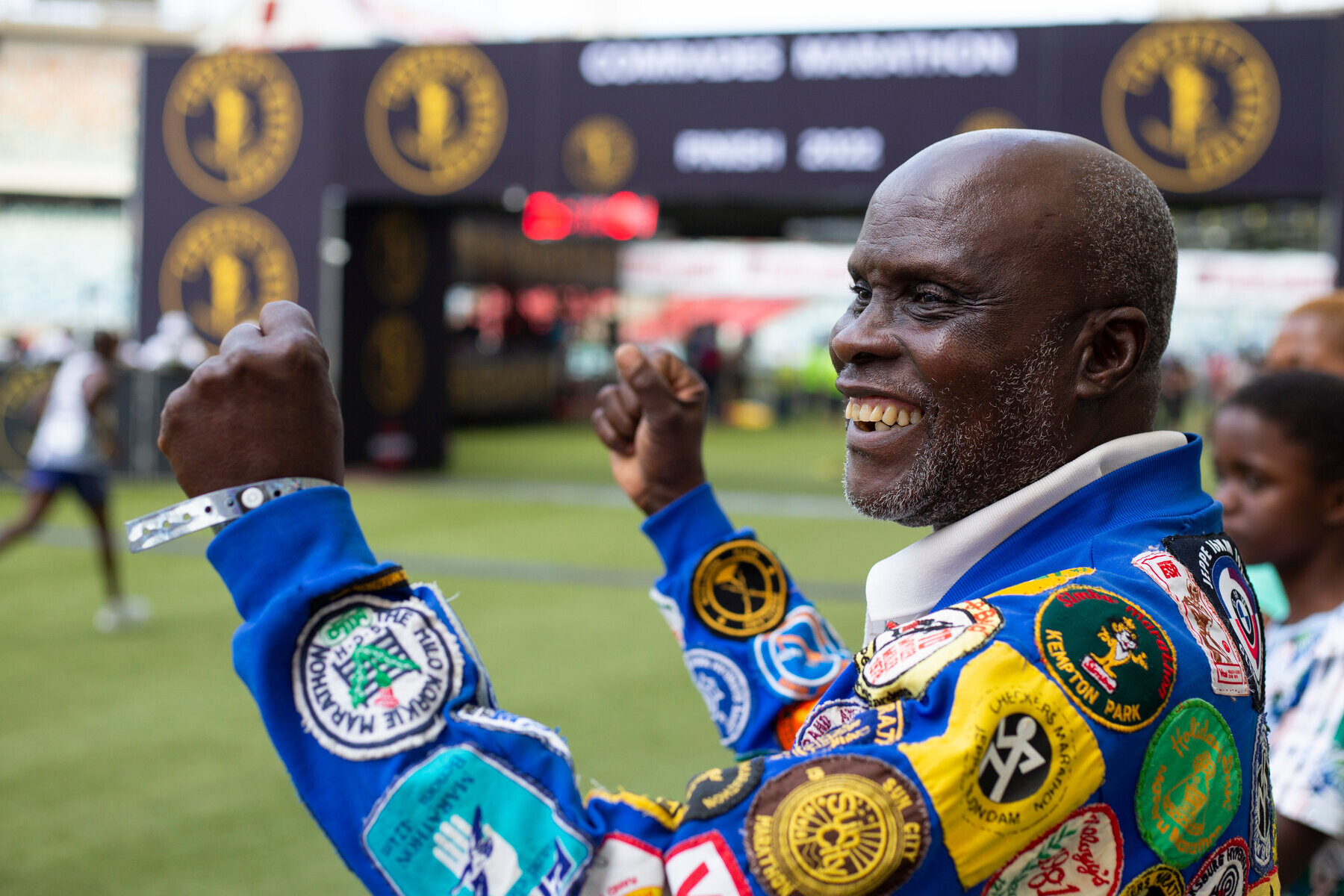
He had been here before. In the 1980s and early 1990s, Tjale racked up four podium finishes at the Comrades, a 56-mile race between the South African cities of Pietermaritzburg and Durban. Today, it is the largest ultramarathon in the world, attracting a field of up to 20,000 runners, throngs of spectators and millions of live television viewers.
The story of how the Comrades became the race it is today is bound up in the story of Tjale and other pioneering Black runners of his generation. In the dying days of South Africa’s apartheid regime, they helped transform the race from a poky, amateur affair into an enormous event that looks much like the country around it.
They did so from one of the most uneven playing fields in the modern world.
Back at the race for the first time in 29 years, Tjale marveled as the top finishers sprinted past him. In his days, nearly every top runner was white. Now, all the top men were Black, wearing the jerseys of big corporate running clubs that paid for them to attend training camps. The 2022 men’s race winner, a university security guard named Tete Dijana, earned around $42,000 in prize money and bonuses. It was equivalent to about a decade of his salary.
“There was none of that in our times,” said Tjale, a retired delivery driver who was living in a shack north of Johannesburg when he ran his final Comrades race in 1993, when the race did not offer a cash prize.
(First photo) The start of the Comrades Marathon at the Pietermaritzburg City Hall. Credit...Rogan Ward for The New York Times
Tjale had been invited back by the Comrades’ organizers to sound a horn marking the cutoff for a special medal given to runners who finish in less than six hours. In the car from the airport two days before, Tjale asked one of them why they had invited him.
Tjale had been invited back by the Comrades’ organizers to sound a horn marking the cutoff for a special medal given to runners who finish in less than six hours. In the car from the airport two days before, Tjale asked one of them why they had invited him. He’d never won the race, after all.
But for Comrades runners, the reason was obvious.
“We are here because of him,” said Freddie Wilson, a runner from Johannesburg, as he waited to take a photograph with Tjale at the race expo. His voice shook with emotion.
Like many Black South Africans, Wilson grew up watching Tjale on TV. His family didn’t have a television, but on Comrades Sunday they would crowd with others in their neighborhood into the lounge of a family who did and spend the entire day watching the race.
Wearing a bucket hat and running with a distinctive, lopsided gait, Tjale was a revelation in the front pack. From inside a country whose government was purpose-built to stifle the ambitions of Black South Africans, here was a Black man doing something audaciously ambitious, for the whole country to see.
(Third photo) Spectators running with Tjale in a Comrades Marathon during the 1980s.Credit...The Comrades Marathon Association
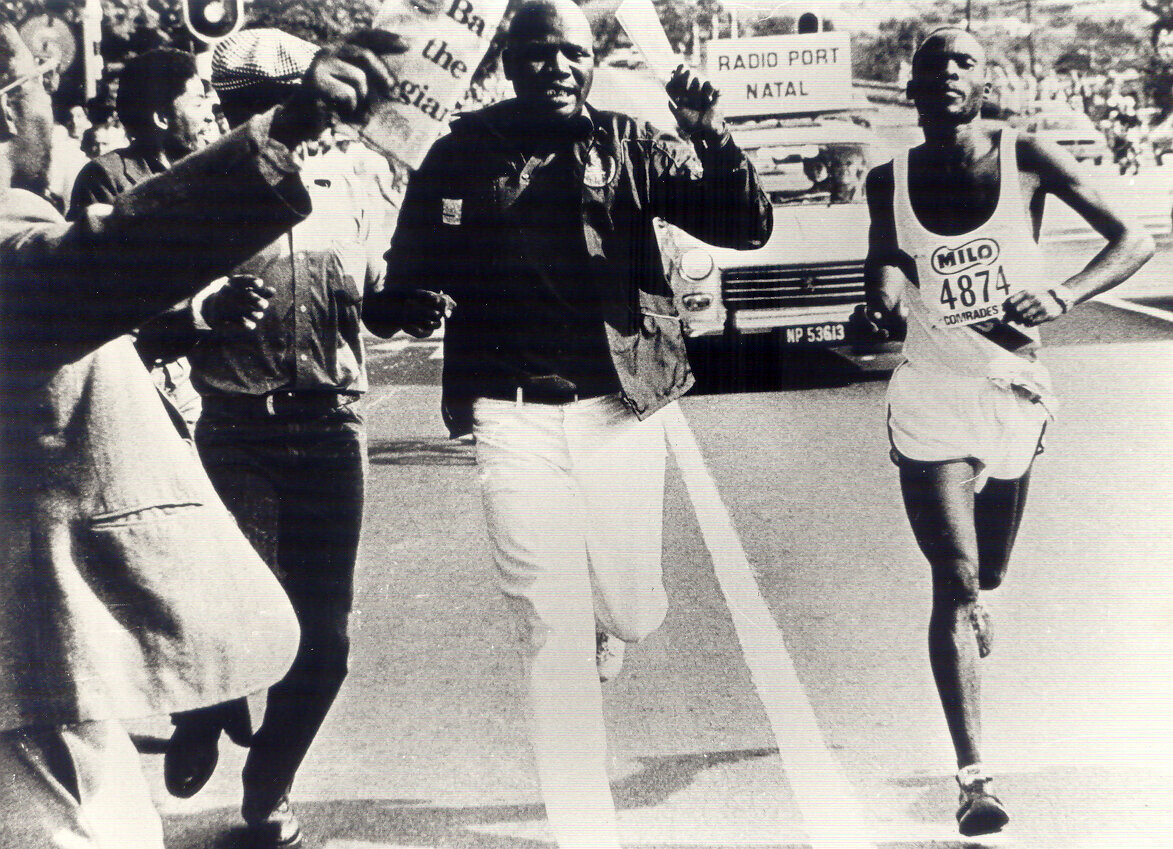
“He was our great,” Sello Mokone, who has run the Comrades 18 times, said. “The moment we saw a Black guy doing this, we knew we could do it too.”
At his peak, Tjale could run 56 miles at a pace of just over six minutes a mile. He racked up dozens of wins at ultramarathons, including at South Africa’s other famous ultra, the 35-mile Two Oceans. Twice, he almost defeated the Comrades’ white folk hero, a floppy-haired blond man named Bruce Fordyce, who won the race nine times between 1981 and 1990.
Bob de la Motte, a white runner who finished second to Fordyce three times, said that Tjale “was the better athlete.”
But while Fordyce focused full-time on the Comrades, living off money from speaking gigs and corporate sponsorships, Tjale worked as a delivery driver, running 15 miles from the crowded workers’ hostel where he lived to his job. On weekends, he ran every local race he could find, from 10 kilometers to 100 kilometers (6.2 miles to 62.1 miles), for prize money to supplement his income.
“He was lucky,” Tjale said of their rivalry.
Tjale grew up in the 1960s in a rural area near the city of Polokwane, formerly known as Pietersburg. He dropped out of school after eighth grade. A few years later, he moved to Johannesburg to work as a live-in gardener for a white family. There, he clipped hedges during the day and washed the family’s dishes after dinner. In between, sometimes, he went for a jog.
In the late 1970s, his running caught the attention of his employer, who helped him buy a pair of sneakers and join a running club. He began entering races, and soon, winning.
It was an auspicious moment to take up distance running. At the time, South Africa was subject to widespread international sports boycotts, which kept the country out of most major events. The nation was desperate to get back in, and in the mid-1970s, the apartheid government announced it would desegregate a minor sport, running.
Amid a global boom in running, entries at races like the Comrades began to tick upward. And South Africa’s single state-run TV station began broadcasting the Comrades live in the early 1980s. Millions watched Black runners like Tjale and white competitors like Fordyce share bottles of water and sling their arms over one another at the finish line.
“In the Comrades, everyone needed help at some point, and people always gave it,” said Poobie Naidoo, another elite South African distance runner from the 1980s, who is of Indian heritage.
But the moment runners like Tjale and Naidoo stepped off the course, they returned to an apartheid reality. In 1979, not long after his first Comrades, Tjale was arrested on his way to work for not having documents showing he was allowed to be in a white part of the city. He spent a night in jail.
“On the road was the only place I sometimes felt like apartheid wasn’t there,” Tjale said.
In 1989, both Tjale and Fordyce participated in a 100-kilometer world championship. Because of the timing, Fordyce skipped the Comrades, and Tjale ran it on tired legs. Another runner, Sam Tshabalala, became the race’s first Black champion. Tjale, meanwhile, ran his final Comrades in 1993, quietly finishing 51st.
In 2016, Tjale, a reserved man with an easy laugh, retired to a 20-acre farm he bought near Polokwane. It was one of the first times since he married in the 1970s that he and his wife had been able to live together, and they spent quiet evenings on their couch cracking jokes and watching soap operas.
He didn’t think much more of the Comrades, besides occasionally turning down invites to events the race hosted. “I was done with that thing,” he said simply.
But this year, a Comrades Marathon Association board member named Isaac Ngwenya called with a plea. Would Tjale come and let himself be honored. He agreed and last weekend boarded a plane for Durban.
Tjale arrived to a race radically transformed from the one he left. At the Comrades expo, thousands of runners — most of them Black — milled around, trading training stories. The night before the race, more than 300 people slept in the Pietermaritzburg Y.M.C.A., where race organizers put up entrants who could not afford accommodation.
“It’s something I can show my son, and myself — that I did this thing,” said Cynthia Smith, a security guard, as she stretched out on her foam mattress.
On the start line at Pietermaritzburg City Hall the next morning, more than 13,000 runners sang an old migrant laborers’ song called Shosholoza, whose title means “go forward.” The gun popped, and they surged into the winter morning.
“It’s like living your entire life in a single day,” Tommy Neitski, a 42-time finisher, said of the race’s mass appeal. It’s also like seeing all of South Africa in a day, on a course that winds its way past shacks and boutique hotels, sugar cane fields and gritty industrial towns.
Tjale arrived at the finish line at Durban’s Moses Mabhida Stadium to sound the six-hour horn. Waiting in a V.I.P. lounge, he ran into Jetman Msuthu-Siyephu, winner of the 1992 race. They spent the morning trading memories.
As the day wore on, the two men watched the salt-streaked runners pour in by the thousands, dissolving in joy and exhaustion as they stumbled over the finish line. Tjale couldn’t stop smiling.
“When we go,” he said to Msuthu-Siyephu, “we will have left something for this world.”
by Ryan Lenora Brown (New York Times)
Login to leave a comment
Comrades Marathon
Arguably the greatest ultra marathon in the world where athletes come from all over the world to combine muscle and mental strength to conquer the approx 90kilometers between the cities of Pietermaritzburg and Durban, the event owes its beginnings to the vision of one man, World War I veteran Vic Clapham. A soldier, a dreamer, who had campaigned in East...
more...South Africa’s Tete Dijana Storms to Victory in the 2022 Edition of Comrades Marathon
Tete Dijana won the Comrades Marathon from Pietermaritzburg to Durban ahead of his teammate Former champion Bongamusa Mthembu took fourth place and broke the Nedbank Running Club's dominance Nedbank Running Club had five athletes in the top 10 of the Comrades Marathon, including the top three
South Africa’s Tete Dijana has won the 2022 edition of the Comrades Marathon. The Nedbank runner stormed to victory, beating his teammate and defending champion, Edward Mothibi.
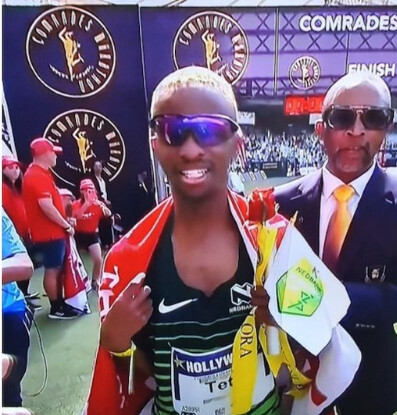
The duo were neck and neck with not too long to go before Dijana took control of the race and never looked back. Dijana, a security guard from the North West, finished the race in 5:30:38 while Mothibi finished in 5:33:46.
Login to leave a comment
Mokoka breaks world 50km record with 2:40:13 in Gqeberha
South Africa’s Stephen Mokoka stepped up to 50km in style on Sunday (6), running 2:40:13* to break the men’s world record for the distance at the Nedbank #Runified 50km – a World Athletics Elite Label road race – in Gqeberha.
The three-time Olympian has been running marathons for more than a decade but made history in his very first 50km race, following the pacemaker through half way in 1:21:03 and then breaking away after 35km (1:52:53) with a 2:56 kilometre to put himself on world record schedule.
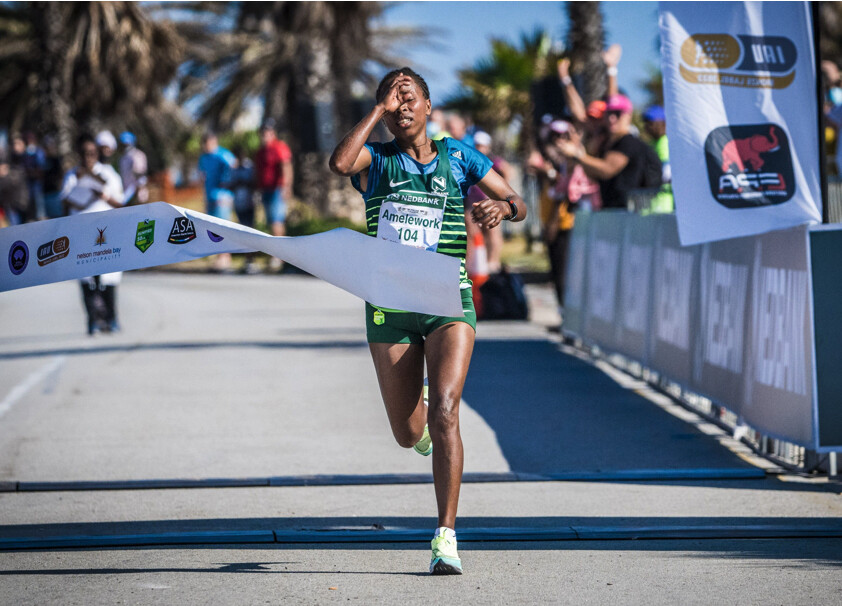
The 2019 world marathon fifth-placer finisher held that pace on the 10km loop course, running a negative split (1:19:10 for the second half) after a solo run to victory. He won by almost four minutes and improved the inaugural world 50km record of 2:42:07 that had been set by Ethiopia’s Ketema Negasa at the same event last year.
"I’m tired," Mokoka said with a smile in his post-race interview. "It’s a long way and I don’t know how I’m going to feel later, but I enjoyed it."
The performance further demonstrates Mokoka's impressive range. The 37-year-old has claimed numerous national titles in his career so far, from 1500m up to the marathon. His marathon best is 2:07:40 from Shanghai in 2015, while he set the South African half marathon record when running 59:36 to place seventh at the 2020 World Half Marathon Championships in Gdynia.
Tete Dijana was runner-up to Mokoka in Gqeberha, clocking 2:44:08, with their compatriot Edward Mothibi – the 2019 Comrades Marathon winner – third in 2:45:27.
Given the increasing popularity of 50km road races, the decision to add the distance to the list of events for which world records are recognised was made at the World Athletics Council meeting in Tokyo in July. Negasa’s 2:42:07 was then ratified as the inaugural men’s world 50km record at the start of this year, while the 3:04:24 run by South Africa’s Irvette van Zyl in the same 2021 event was ratified as the world 50km record for a women-only race.
That time had been the target for athletes in Sunday’s Nedbank #Runified 50km and the women's field went off with intent, the leaders passing 10km in 35:51 and half way in 1:31:34.Ethiopia’s Amelework Fikadu Bosho later dropped her rivals and although she was not able to maintain that world record pace, she hung on for a dominant women’s race win in 3:04:58.
Kenya’s Shelmith Muriuki was second in 3:08:30, while Van Zyl was third in 3:13:23.
by World Athletics
Login to leave a comment


